Journey Into Amazing Caves – featuring The Moody Blues
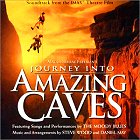 A bit of a surprising discovery, this is actually the soundtrack of a National Geographic-sponsored IMAX documentary film, and it’s the product of the same team that re-arranged orchestral versions of George Harrison and Jeff Lynne tunes from Harrison’s Cloud Nine to serve as the musical backdrop of an Imax film about scaling Everest.
A bit of a surprising discovery, this is actually the soundtrack of a National Geographic-sponsored IMAX documentary film, and it’s the product of the same team that re-arranged orchestral versions of George Harrison and Jeff Lynne tunes from Harrison’s Cloud Nine to serve as the musical backdrop of an Imax film about scaling Everest.
For this outing’s almost ethereal settings, the filmmakers and their resident composers opted to rearrange some Moody Blues songs into new compositions, picking both the old (“Nights In White Satin” from Days Of Future Passed) and the much more recent (“I Know You’re Out There Somewhere” from Sur La Mer). The Moodies themselves actually contribute two new tracks not featured on any of their other albums – the pleasant rock instrumental “Water” and the uplifting “We Can Fly”. On several other tracks, Hayward and Lodge alone add guitar and vocals to some of the rearranged songs, breaking into a nifty little jazzy version of “Question” at one point. Most of the time, however, they’re serving as little more than celebrity session musicians.
The arrangements themselves are quite nice, bringing some Native American influences to bear on a score that quotes – more often than any other Moodies hit – “Nights In White Satin”. One cue, “Horizons Turn Inward”, is actually quite a good, bombastic piece of action music, mostly unrelated to any Moody Blues  songs, which also winds up culminating in “Nights”.
songs, which also winds up culminating in “Nights”.
The soundtrack from Journey Into Amazing Caves may not be the new album Moodies fans are waiting for…but it’s an interesting glimpse at what else the band has been doing with its time, and features fascinating twists on old favorites.
- To Extremes (4:17)
- Search For Daylight (4:05)
- Arizona (5:00)
- Water (2:46)
- Crystal Chamber (3:32)
- Blue Cathedral (3:50)
- Frozen In Time (4:15)
- Home Of The Mayan Gods (5:01)
- Horizons Turn Inward (5:26)
- We Can Fly (4:04)
Released by: Ark 21 Records
Release date: 2001
Total running time: 42:16
Ben Folds – Rockin’ The Suburbs
 If you’re worried about Ben Folds Five disbanding, don’t be. If you’re worried that post-Five Folds would sound like Ben’s ill-fated 1998 side project, there’s no cause for concern. This album, Folds’ first solo project, proves that he’s certainly got the stuff to forge ahead on his own.
If you’re worried about Ben Folds Five disbanding, don’t be. If you’re worried that post-Five Folds would sound like Ben’s ill-fated 1998 side project, there’s no cause for concern. This album, Folds’ first solo project, proves that he’s certainly got the stuff to forge ahead on his own.
Sticking to the same musical-hermit-crab-with-a-few-guests style that Jeff Lynne adopted for the latest ELO album, Folds plays almost everything himself, though he occasionally has a helping hand with vocals, and tracks several numbers with a string section backing conducted by longtime collaborator John Mark Painter. The result is something which, in places, sounds quite a bit like Ben Folds Five – many of the songs were written and arranged for a piano/bass/drum combo – but is a major evolutionary jump. Folds is famous for his humorous, geek-angst-ridden songs, but he’s also known for his uncanny ability to set short character sketches to music. He shows his pop acumen a little more obviously here than on any of his previous work (with the possible exception of the Five’s lovely swan song), with wall-of-sound harmony backing vocals, and amazingly catchy hooks. If there’s a failing to Folds’ D.I.Y. approach, it’s his drumming – Benny, you don’t have to hit the cymbals on every beat. They’re an accent thing. This style almost distracts one from the majestic pop hooks of “Gone” and a few other songs.
The cryptically titled “Fred Jones, Part 2” (there’s no evidence of part 1 anywhere) is a beautifully-arranged melancholy tale of a man’s thankless last day at a job he’s held for 25 years (the whole song is buoyed by a solo cello that makes it even sadder), while “Losing Lisa” sports an arrangement that’s almost straight out of a Phil Spector ’60s epic. “Carrying Cathy”, a song about a guy whose friend is suicidally depressed, really hit home with me, since I’ve lived that story before (though thank God it wasn’t a “successful suicide” – and though I’m tempted to go off on a tirade about what a horrible term that is, I’ll save it for another time). “Fired” is a gloriously goofy story of a manager who’d love nothing more than to shitcan his entire staff (a song I’ll probably be blasting at work before too long, and which reminds me a lot of “Steven’s Last Night In Town” from Whatever And Ever Amen), and the title track – also the album’s lead single – is perhaps the biggest nod to the Ben Folds Five legacy, the hilarious and profanity-ridden lament of a small-time musician  who must “face the fact that some producer with computers will fix all my shitty tracks.” The thing is, that song is not representative of the other songs around it, and some listeners expecting more boisterous tunes along the lines of Suburbs may feel like they’ve been misled. But for me, I actually prefer the rest of the album to that single – and I think it’ll open a few eyes and ear to Folds’ potential as well.
who must “face the fact that some producer with computers will fix all my shitty tracks.” The thing is, that song is not representative of the other songs around it, and some listeners expecting more boisterous tunes along the lines of Suburbs may feel like they’ve been misled. But for me, I actually prefer the rest of the album to that single – and I think it’ll open a few eyes and ear to Folds’ potential as well.
- Annie Waits (4:17)
- Zak And Sara (3:11)
- Still Fighting It (4:25)
- Gone (3:22)
- Fred Jones, Part 2 (3:45)
- The Ascent Of Stan (4:14)
- Losing Lisa (4:10)
- Carrying Cathy (3:49)
- Not The Same (4:17)
- Rockin’ The Suburbs (4:58)
- Fired (3:49)
- The Luckiest (4:25)
Released by: Epic
Release date: 2001
Total running time: 48:42
Traveling Wilburys – Volume Three
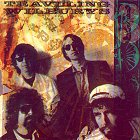 In the absence of the late Roy Orbison, the remaining Wilburys – Tom Petty, Bob Dylan, George Harrison and Jeff Lynne – soldiered onward to create a memorable second album, paradoxically titled Volume Three. While replacement for Orbison were bandied about by speculating fans and the music press, ranging from Carl Perkins to Del Shannon, the four surviving Wilburys didn’t fill the empty slot.
In the absence of the late Roy Orbison, the remaining Wilburys – Tom Petty, Bob Dylan, George Harrison and Jeff Lynne – soldiered onward to create a memorable second album, paradoxically titled Volume Three. While replacement for Orbison were bandied about by speculating fans and the music press, ranging from Carl Perkins to Del Shannon, the four surviving Wilburys didn’t fill the empty slot.
Volume Three opens with the hard-rocking “She’s My Baby”, with guest star Gary Wright jamming along on this number which swings wide of the group’s acoustic-only ambitions from their first album. Lynne, Harrison, Dylan and Petty each take their turn at the lead vocal, and one can definitely hear Lynne’s hand in the somewhat more polished background harmonies.
Other highlights include Lynne’s piano-heavy boogie “New Blue Moon”, Petty’s shuffling, lyric-heavy rocker “Cool Dry Place”, “Inside Out”, and the group’s tribute to Orbison, You Took My Breath Away. But some  of the tracks ramble just a little bit and dig a style rut early on.
of the tracks ramble just a little bit and dig a style rut early on.
Both volumes of the Traveling Wilburys’ musical adventures are due to be re-released soon by Warner Bros. in connection with Harrison’s Dark Horse label.
- She’s My Baby (3:12)
- Inside Out (3:33)
- If You Belonged To Me (3:11)
- The Devil’s Been Busy (3:18)
- 7 Deadly Sins (3:14)
- Poor House (3:14)
- Where Were You Last Night? (3:00)
- Cool Dry Place (3:33)
- New Blue Moon (3:15)
- You Took My Breath Away (3:18)
- Wilbury Twist (2:59)
Released by: Warner Bros.
Release date: 1990
Total running time: 35:$7
Genesis – The Lamb Lies Down On Broadway
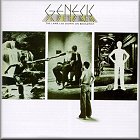 Peter Gabriel’s last outing with Genesis is something I’ve heard since I was kid, barely able to comprehend the bizarre quasi-mythological story being told in the songs. Now I’m an equally perplexed adult, still barely able to “get” The Lamb Lies Down On Broadway, despite the nice new remastered CD edition which has the complete original libretto and lyrics. And yeah, this is one rock opera which demands a thorough reading of its rhyming, sometimes humorous libretto.
Peter Gabriel’s last outing with Genesis is something I’ve heard since I was kid, barely able to comprehend the bizarre quasi-mythological story being told in the songs. Now I’m an equally perplexed adult, still barely able to “get” The Lamb Lies Down On Broadway, despite the nice new remastered CD edition which has the complete original libretto and lyrics. And yeah, this is one rock opera which demands a thorough reading of its rhyming, sometimes humorous libretto.
Lamb is ostensibly the story of a Puerto Rican-born street kid named Rael, lurking in the streets of the Big Apple and announcing his name to the world with his can of spray paint. A series of misadventures leads him to an underworld beneath the streets of Manhattan, which in turn becomes a bizarre mixture of seemingly-familiar mythological archetypes and far-fetched ideas from Gabriel’s own imagination.
In short, this makes OVO look tame by comparison.
 I like Gabriel’s way with words and the music here, particularly “Carpet Crawlers” and “The Chamber Of 32 Doors”. On their own, several of the songs stand up well. I really only get baffled trying to take in the larger canvas of Lamb‘s surreal storyline – but hey, if the music hits you in the right mood, this double-album is way ahead of its time. And even at its most cryptic, I find Gabriel-era Genesis far more stimulating and thought-provoking than, say, Invisible Touch-era Genesis.
I like Gabriel’s way with words and the music here, particularly “Carpet Crawlers” and “The Chamber Of 32 Doors”. On their own, several of the songs stand up well. I really only get baffled trying to take in the larger canvas of Lamb‘s surreal storyline – but hey, if the music hits you in the right mood, this double-album is way ahead of its time. And even at its most cryptic, I find Gabriel-era Genesis far more stimulating and thought-provoking than, say, Invisible Touch-era Genesis.
Disc one
- The Lamb Lies Down On Broadway (4:52)
- Fly On A Windshield (4:22)
- Broadway Melody Of 1974 (0:33)
- Cuckoo Cocoon (2:11)
- In The Cage (8:13)
- The Grand Parade Of Lifeless Packaging (2:47)
- Back In N.Y.C. (5:43)
- Hairless Heart (2:13)
- Counting Out Time (3:40)
- Carpet Crawlers (5:17)
- The Chamber Of 32 Doors (5:14)
Disc two
- Lilywhite Lilith (2:44)
- The Waiting Room (5:24)
- Anyway (3:07)
- Here Comes The Supernatural Anaesthetist (2:58)
- The Lamia (6:56)
- Silent Sorrow In Empty Boats (3:06)
- The Colony Of Slippermen (8:16)
- Ravine (2:04)
- The Light Dies Down On Broadway (3:32)
- Riding The Scree (3:55)
- In The Rapids (2:28)
- it. (4:15)
Released by: Atlantic
Release date: 1974
Disc one total running time: 45:28
Disc two total running time: 48:41
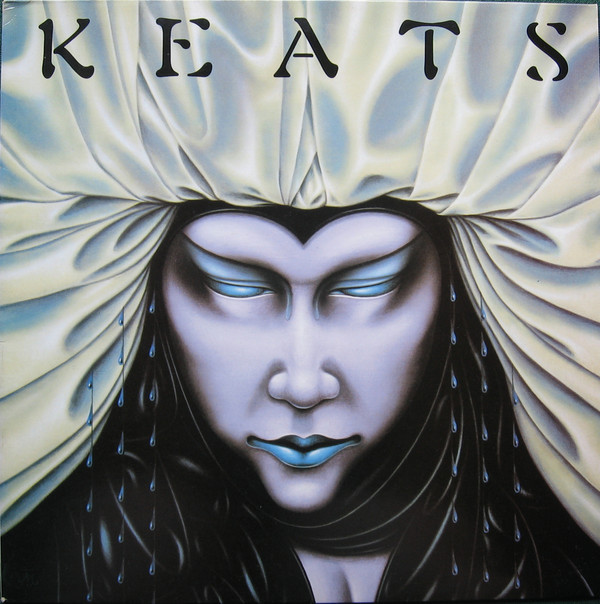
Keats
 In 1993, after splitting with Alan Parsons Project co-founder Eric Woolfson (who was destined for a new career in musical theater with his Freudiana project, which itself resulted in an excellent if obscure Project album), the aforementioned Mr. Parsons re-launched his group minus the Project moniker – and, for the first time, accepted songs written by members of the long-time group members. (Virtually all of the Project tunes were written by Woolfson and Parsons, with a few choice contributions by orchestral arranger Andrew Powell of Ladyhawke fame). But almost ten years before 1993’s Try Anything Once album, there was a self-titled one-off effort by the Project backing band, operating under the name of Keats.
In 1993, after splitting with Alan Parsons Project co-founder Eric Woolfson (who was destined for a new career in musical theater with his Freudiana project, which itself resulted in an excellent if obscure Project album), the aforementioned Mr. Parsons re-launched his group minus the Project moniker – and, for the first time, accepted songs written by members of the long-time group members. (Virtually all of the Project tunes were written by Woolfson and Parsons, with a few choice contributions by orchestral arranger Andrew Powell of Ladyhawke fame). But almost ten years before 1993’s Try Anything Once album, there was a self-titled one-off effort by the Project backing band, operating under the name of Keats.
With such legendary session players as guitar god Ian Bairnson and ex-Pilot members David Paton and Stuart Elliott, Keats isn’t short on talent – but the Keats album sounds like it’s a little short on inspiration. Parsons produces, and that’s a big part of the problem – it sounds like a lost Alan Parsons Project record, only the songs aren’t anything that leap out at the listener. “Walking On Ice” is the best song here by miles, with some excellent vocal harmonies and intriguing keyboard and synth work. Most of the other songs are the aural equivalent of blending into the wallpaper, with a distinctly 80s sound (and one of which veers dangerously close to copying Survivor’s “Eye Of The Tiger”).
This reissue by Renaissance Records – an indie label which has released CDs by such artists as Bill Mumy and The Be Five – is rounded out by two interviews and some previously unreleased tracks. The interviews are informative, if rather perfunctory, but will yield little information not already known to die-hard Alan Parsons Project fanatics.
- Heaven Knows (3:56)
- Tragedy (5:01)
- Fight To Win (4:10)
- Walking On Ice (3:31)
- How Can You Walk Away (3:41)
- Turn Your Heart Around (3:44)
- Avalanche (4:06)
- Give It Up (4:25)
- Ask No Questions (3:24)
- Night Full Of Voices (3:56)
- Hollywood Heart (3:43)
- interviews with Alan Parsons and Ian Bairnson (26:00)
Released by:
Release date:
Total running time:
Emperor: The Battle For Dune
 When you see a quarter of a dozen screenwriters on a project, run screaming. Sometimes the same applies to composers, but not always – some of my all-time favorite soundtracks are the products of triumvirates of musicians. Take, for example, the soundtrack from 1996’s Doctor Who movie, or the soundtrack from Alien Nation. But I’ve never before encountered a computer game whose music was cooked up by committee – however, in the case of Emperor, it works.
When you see a quarter of a dozen screenwriters on a project, run screaming. Sometimes the same applies to composers, but not always – some of my all-time favorite soundtracks are the products of triumvirates of musicians. Take, for example, the soundtrack from 1996’s Doctor Who movie, or the soundtrack from Alien Nation. But I’ve never before encountered a computer game whose music was cooked up by committee – however, in the case of Emperor, it works.
Before any screams about the lack of availability information on this, I’ll go ahead and point out right now that the Emperor soundtrack is a limited edition item which was only available with some pre-orders of the game. And I have to complain bitterly about the lack of neat packaging, or, for that matter, almost any packaging whatsoever. I was reminded somewhat of the days when I had to generate my own Babylon 5 CD covers. But when was the last time anyone bought a CD because of cool packaging? Okay, aside from last Tuesday, probably not anytime recently. The music is what counts. I just had to vent about the whole “generic CD-ROM paper envelope” treatment.
The musical duties for Emperor were split three ways between composers David Arkenstone (who has worked on prior Westwood/Electronic Arts titles such as the Lands Of Lore series), Jarrid Mendelson (who composed music for the Command & Conquer sequel Tiberian Sun, and Westwood’s primary in-house composer Frank Klepacki (who we recently interviewed here at theLogBook.com). That’s a bit of a problem in places, because there are places where I’d swear that they thought they were still composing for a Command & Conquer game.
Klepacki’s music remains the truest to what went before with the music from Dune 2000, Westwood’s previous interactive foray into Frank Herbert’s fictional universe. (And this is a no-brainer, since Klepacki did all of the music for that game.) David Arkenstone’s themes for the Harkonnen are all cut from the same heavy-metal cloth, while Mendelson’s Ordos orchestrations demonstrate that he’s been listening to a lot of Nine Inch Nails.
The highlights include the pounding anthem “Ride The Worm” and “Not An Option”, quite possibly the best  Nine Inch Nails song that Trent Reznor & co. never actually played.
Nine Inch Nails song that Trent Reznor & co. never actually played.
Despite my misgivings about some of the music fitting better into the Command & Conquer millieu than the world of Dune, it’s all quite enjoyable, and stands well on its own apart from the game. Klepacki especially is proving without a doubt that he’s ready to score a movie or perhaps some TV.
- The War Begins (4:33)
- The Machine (4:50)
- Not An Option (3:52)
- Unstoppable (5:50)
- Ride The Worm (5:35)
- Sabotage (4:19)
- Harkonnen Force (5:29)
- Assembling The Troops (7:42)
- Ghola (3:48)
- Legacy (6:14)
- The Specimen (5:06)
- The Spice Must Flow (4:47)
- Tribute To Evil (6:21)
Released by: Westwood Studios / Electronic Arts
Release date: 2001
Total running time: 68:26
Police – Synchronicity
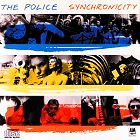 I’ve long had a love-hate relationship with the final Police album, but upon a recent listening I finally decided I love it more than I hate it.
I’ve long had a love-hate relationship with the final Police album, but upon a recent listening I finally decided I love it more than I hate it.
So what’s not to like? Quite simply one of the most overexposed songs of the 1980s, “Every Breath You Take”. And hey, I even like the song, but it was played so often that I can really only bear to hear it once a year or so. (That said, I’ll take “Every Breath” over anything the current crop of producer-packaged teenybopper acts can cough up, so my boredom with the song is a relative thing.)
What is there to like about Synchronicity? Possibly Sting’s best work ever, with some crisply literate lyrics and some excellent music to go behind them. Mixing mythological metaphors with literary references and interesting concepts, the songs are both memorable and thought-provoking. So much so, in fact, that I think it points out why I skip “Every Breath” most of the time – its somewhat repetitive and predictable lyrics are sharply out of place on Synchronocity.
 Some of the better songs, including “King Of Pain” and “Wrapped Around Your Finger”, made a somewhat smaller splash as singles, while others – including the mesmerising “Tea In The Sahara” – can only be found on the album. Overall, even with the clichè-ridden “Every Breath”, Synchronicity is an outstanding album, engaging both musically and intellectually.
Some of the better songs, including “King Of Pain” and “Wrapped Around Your Finger”, made a somewhat smaller splash as singles, while others – including the mesmerising “Tea In The Sahara” – can only be found on the album. Overall, even with the clichè-ridden “Every Breath”, Synchronicity is an outstanding album, engaging both musically and intellectually.
- Synchronicity I (3:23)
- Walking In Your Footsteps (3:35)
- O My God (4:00)
- Mother (3:03)
- Miss Gradenko (2:00)
- Synchronicity II (5:04)
- Every Breath You Take (4:13)
- King Of Pain (4:59)
- Wrapped Around Your Finger (5:12)
- Tea In The Sahara (4:11)
- Murder By Numbers (4:31)
Released by: A&M
Release date: 1983
Total running time: 44:30
Superman: The Movie – music by John Williams
 The music from the Star Wars trilogy alone would qualify John Williams as a genius. The music from Superman confirms this, as do many other of his works. One of these days, despite the pop culture roots of his work, Williams will overcome all the naysayers’ claims that he’s merely been running Wagner, Holst and Korngold through a musical cuisinart.
The music from the Star Wars trilogy alone would qualify John Williams as a genius. The music from Superman confirms this, as do many other of his works. One of these days, despite the pop culture roots of his work, Williams will overcome all the naysayers’ claims that he’s merely been running Wagner, Holst and Korngold through a musical cuisinart.
Need proof? One need look no further than Williams’ score for the 1978 Richard Donner opus Superman, that rare commodity known as A Good Superhero Movie. (Indeed, as far as this viewer is concerned, the next Good Superhero Movie was 2000’s X-Men, but that’s a whole other article.)
While it shares a few common musical threads with the music from Star Wars, Williams’ accompaniment for the world’s most famous superhero has, in places, an inexplicably more down-to-earth feel. The main theme is just as well known as the signature tune of Star Wars, yet the rest of the score has some true gems as well, including “The Trip To Earth”, “The Death Of Jonathan Kent” and “Leaving Home” (these two are practically joined at the hip), “The Big Rescue” and “Turning Back The World”. Many of these pieces, surprisingly, were not on the original soundtrack album, but fortunately the entire score was located and remastered for this 2-CD release (which preceeded the DVD release of the movie by several months). The sound is excellent, the liner notes booklet is positively brimming with a wealth of fascinating information on both movie and music, and for  those who actually want to hear “Can You Read My Mind?”, there are no fewer than four different versions here, two of them featuring the poetic reading of the lyrics by one Margot “Lois Lane” Kidder. (For those who actually want to hear all four of these, knock yourself out – I must admit, I don’t listen to ’em too often.)
those who actually want to hear “Can You Read My Mind?”, there are no fewer than four different versions here, two of them featuring the poetic reading of the lyrics by one Margot “Lois Lane” Kidder. (For those who actually want to hear all four of these, knock yourself out – I must admit, I don’t listen to ’em too often.)
Disc one
- Prelude and Main Title March (5:29)
- The Planet Krypton (6:40)
- Destruction of Krypton (7:52)
- Star Ship Escapes (2:21)
- The Trip To Earth (2:28)
- Growing Up (2:34)
- Death of Jonathan Kent (3:24)
- Leaving Home (4:51)
- The Fortress of Solitude (9:17)
- Welcome to Metropolis (2:11)
- Lex Luthor’s Lair (4:47)
- The Big Rescue (5:55)
- Super Crime Fighter (3:20)
- Super Rescues (2:13)
- Luthor’s Luau (2:47)
- The Planet Krypton alternate (4:24)
- Main Title March alternate (4:36)
Disc two
- Superman March alternate (3:48)
- The March of the Villains (3:36)
- The Terrace (1:34)
- The Flying Sequence (8:13)
- Lois and Clark (0:50)
- Crime of the Century (3:23)
- Sonic Greeting (2:21)
- Misguided Missiles and Kryptonite (3:26)
- Chasing Rockets (4:55)
- Superfeats (4:52)
- Super Dam and Finding Lois (5:11)
- Turning Back The World (2:06)
- Finale and End Title March (5:42)
- Love Theme from Superman (5:05)
- Can You Read My Mind – alternate (2:58)
- Flying Sequence / Can You Read My Mind (Margot Kidder – vocals) (8:10)
- Can You Read My Mind (instrumental) (2:56)
- Theme from Superman (concert version) (4:24)
Released by: Rhino
Release date: 2000
Disc one total running time: 75:09
Disc two total running time: 73:30
Pete Yorn – musicforthemorningafter
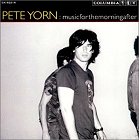 Pete Yorn is one of the best songwriters I have ever heard; the 14 songs on his debut album musicforthemorningafter are some of the best-constructed pieces of music you’ll ever have the pleasure of listening to. Yorn combines a number of guitars, synths, drums and other instruments to create layers of sound supported by catchy melodies that are full of energy and feeling. The opening track (and first single) “Life On A Chain” starts with a crackling, sounds-like-it’s-being-played-on-a-turntable acoustic guitar intro, kicks in with the drums and the electric guitars 30 seconds in, then ups the tempo again with some nice bass work after another 30 seconds. The song’s complexity and tempo keep it charging forward, kept on track by the crisp percussion. Whenever I hear the song, I wish I could play an instrument, because I want to get in on the fun – as it is I just settle for attracting stares on the bus with my not-quite-in-tune air guitar and air drum playing.
Pete Yorn is one of the best songwriters I have ever heard; the 14 songs on his debut album musicforthemorningafter are some of the best-constructed pieces of music you’ll ever have the pleasure of listening to. Yorn combines a number of guitars, synths, drums and other instruments to create layers of sound supported by catchy melodies that are full of energy and feeling. The opening track (and first single) “Life On A Chain” starts with a crackling, sounds-like-it’s-being-played-on-a-turntable acoustic guitar intro, kicks in with the drums and the electric guitars 30 seconds in, then ups the tempo again with some nice bass work after another 30 seconds. The song’s complexity and tempo keep it charging forward, kept on track by the crisp percussion. Whenever I hear the song, I wish I could play an instrument, because I want to get in on the fun – as it is I just settle for attracting stares on the bus with my not-quite-in-tune air guitar and air drum playing.
“Life On A Chain” is the best song on the album – hell, it might be the best song of the year, although R.E.M.’s “The Lifting” would give it a run for the money – but this album is not a one-hit wonder. “For Nancy (‘Cos It Already Is)”, “Murray” and “Closet” are very satisfying up-tempo rock/pop songs with many of the same strengths as “Life”. On slower tracks like “Just Another” and “Lose You” the music amplifies and echoes the pessimism and melancholy of Yorn’s lyrics. The guitars on “Sense” wrap around each other to create a palpable sense of yearning; Yorn’s downcast, almost-mumbling vocals are at their best on this song. “On Your Side” is a lush, serene song that uses strings, synths and acoustic guitar to create a dream-like effect; I may wake up before dawn some time soon because this is the kind of song that was made to be heard while watching a sunrise.
The lyrics on musicforthemorningafter are a bit incomprehensible – they’re fragments of meaning, the kind of poetry that would either occupy an advanced high school lit class for a week or have everyone throwing up their hands in frustration. Since the lyrics don’t convey a straightforward narrative or even a single clear emotional theme, the bits and pieces blend in with the music, which creates a satisfying listening experience that also lets the listener project specific meanings onto the songs. Yorn also constructs the lyrics in such a way that key phrases are repeated throughout the song, with a word or two changed at the end to suggest a shift in perspective or meaning. It’s an effective technique, and one that makes the lyric sheet  worth reading.
worth reading.
musicforthemorningafter ranks with R.E.M.’s Automatic For The People, dada’s Puzzle and Matthew Sweet’s Girlfriend as a top-notch modern rock album that’s well worth a listen, or five, or more…
- Life on a Chain (3:45)
- Strange Condition (3:57)
- Just Another (3:14)
- Black (4:11)
- Lose You (4:35)
- For Nancy (‘Cos It Already Is) (3:30)
- Murray (3:45)
- June (2:34)
- Sense (3:53)
- Closet (3:03)
- On Your Side (5:02)
- Sleep Better (4:28)
- EZ (4:41)
- Simonize (2:54)
Released by: Sony
Release date: 2001
Sting – Ten Summoners’ Tales
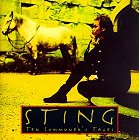 A little bit more manic than Blue Turtles, this album begat the singles “If I Ever Lose My Faith In You” and “Fields Of Gold”, but the fun doesn’t stop there. In fact, there are songs which are vastly superior to those singles, my favorites of which are “Heavy Cloud, No Rain” (possibly the closest Sting has ever come to returning to the jazz style heard on Turtles) and the starkly somber “Shape Of My Heart”. I strongly advise those who really liked Turtles to give this one a listen.
A little bit more manic than Blue Turtles, this album begat the singles “If I Ever Lose My Faith In You” and “Fields Of Gold”, but the fun doesn’t stop there. In fact, there are songs which are vastly superior to those singles, my favorites of which are “Heavy Cloud, No Rain” (possibly the closest Sting has ever come to returning to the jazz style heard on Turtles) and the starkly somber “Shape Of My Heart”. I strongly advise those who really liked Turtles to give this one a listen.
- If I Ever Lose My Faith In You (4:25)
- Love Is Stronger Than Justice (The Munificent Seven) (5:09)
- Fields Of Gold (5:40)
- Heavy Cloud, No Rain (5:46)
- She’s Too Good For Me (2:30)
- Seven Days (4:39)
Saint Augustine In Hell (5:17)
- It’s Probably Me (5:08)
- Shape Of My Heart (4:38)
- Something The Boy Said (5:28)
- Epilogue: Nothin’ ‘Bout Me (3:41)
Released by: A&M
Release date: 1993
Total running time: 52:21
Julian Lennon – Valotte
 Kicking off with a lovely ballad which shares the album’s title, the first effort by John Lennon’s eldest son is almost eerie to listen to today, and it affected Julian’s career forever. Was he deliberately trying to sound like his father? Could he have avoided it even if he had tried? In the end, the questions are moot. “Valotte” – the song, not the entire album – sounds more like a lost John Lennon opus than either of the “new” Beatles songs created when the elder Lennon’s former bandmates “finished” incomplete songs in 1995. Julian’s vocals are spot-on perfect for the song and its subject matter, and it’s written and arranged in a way that echoes John’s songwriting and performance eerily. “Lonely”, a bluesy ballad which didn’t make it to single status, is another example of the haunting similarities. But there is another side to the album – several relentlessly ’80s pop songs (“Jesse” is especially guilty of dating itself). But overall, the good
Kicking off with a lovely ballad which shares the album’s title, the first effort by John Lennon’s eldest son is almost eerie to listen to today, and it affected Julian’s career forever. Was he deliberately trying to sound like his father? Could he have avoided it even if he had tried? In the end, the questions are moot. “Valotte” – the song, not the entire album – sounds more like a lost John Lennon opus than either of the “new” Beatles songs created when the elder Lennon’s former bandmates “finished” incomplete songs in 1995. Julian’s vocals are spot-on perfect for the song and its subject matter, and it’s written and arranged in a way that echoes John’s songwriting and performance eerily. “Lonely”, a bluesy ballad which didn’t make it to single status, is another example of the haunting similarities. But there is another side to the album – several relentlessly ’80s pop songs (“Jesse” is especially guilty of dating itself). But overall, the good  outweighs the bad – and one wishes that perhaps the critics had kept their mouths shut when Valotte was released. After all, Julian Lennon has spent years trying to get away from the trying-to-sound-like-Dad criticisms that were leveled at his solo debut. Now, how do we convince him that sounding eerily like his father was never necessarily a bad thing?
outweighs the bad – and one wishes that perhaps the critics had kept their mouths shut when Valotte was released. After all, Julian Lennon has spent years trying to get away from the trying-to-sound-like-Dad criticisms that were leveled at his solo debut. Now, how do we convince him that sounding eerily like his father was never necessarily a bad thing?
- Valotte (4:15)
- OK For You (3:38)
- On The Phone (4:42)
- Space (4:22)
- Well I Don’t Know (4:35)
- Too Late For Goodbyes (3:30)
- Lonely (3:50)
- Say You’re Wrong (3:25)
- Jesse (3:48)
- Let Me Be (2:12)
Released by: Atlantic
Release date: 1984
Total running time: 38:39
Argent – The Argent Anthology: Greatest Hits
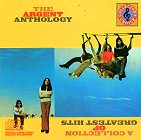 Formed by former Zombies frontman Rod Argent (and named after himself), Argent is one of those bands who carved its niche in rock history with a tiny handful of hits. Two of those songs, “Time Of The Season” and “Hold Your Head Up”, are common reference points for fans and musicians on the modern-day power pop scene. The latter of those two is a true pop anthem, and that song alone is worth the price of the entire CD (which I suppose is easy enough for me to say, since it’s really a bit of a budget release). Argent’s music is heavy on the electric organ fetish that a lot of early 1970s power pop seemed to have, as well as many a funky bass line. Sometimes that works, and other times it doesn’t. I love “Hold Your Head Up”, and even though I’ve heard “Time Of The Season” so many times that I’m positively sick of it, I’ll give it points for being an excellent arrangement and decent song. I don’t remember “Tragedy” getting a great deal of airplay,
Formed by former Zombies frontman Rod Argent (and named after himself), Argent is one of those bands who carved its niche in rock history with a tiny handful of hits. Two of those songs, “Time Of The Season” and “Hold Your Head Up”, are common reference points for fans and musicians on the modern-day power pop scene. The latter of those two is a true pop anthem, and that song alone is worth the price of the entire CD (which I suppose is easy enough for me to say, since it’s really a bit of a budget release). Argent’s music is heavy on the electric organ fetish that a lot of early 1970s power pop seemed to have, as well as many a funky bass line. Sometimes that works, and other times it doesn’t. I love “Hold Your Head Up”, and even though I’ve heard “Time Of The Season” so many times that I’m positively sick of it, I’ll give it points for being an excellent arrangement and decent song. I don’t remember “Tragedy” getting a great deal of airplay,  but it’s probably my favorite of the lesser-known songs in the collection.
but it’s probably my favorite of the lesser-known songs in the collection.
The Argent Anthology is a nice collection, but it points up a couple of things: sometimes the one- or two-hit wonders happen because the band in question is a one-sound wonder. But few pull that off as well as Rod Argent and company did.

- Hold Your Head Up (6:17)
- Liar (3:14)
- Pleasure (4:54)
- God Gave Rock ‘N’ Roll To You (6:45)
- It’s Only Money Part I (4:06)
- Thunder And Lightning (5:09)
- Tragedy (4:48)
- Time Of The Season (6:37)
Released by: Epic
Release date: 1976
Total running time: 41:50
Ralf Illenberger – The Kiss: Five Waves Of Bliss
 Ralf Illenberger returns for his third post-Narada effort on indie label In Joy Records, and this time he’s got another winner…and an unusual concept.
Ralf Illenberger returns for his third post-Narada effort on indie label In Joy Records, and this time he’s got another winner…and an unusual concept.
The Kiss: Five Waves Of Bliss takes the form of a long, instrumental suite, subtle at times, but too involved to ever become mere background music, as with most of Illenberger’s guitar jazz pieces. The music kicks in with his unmistakable style in the second movement, Love Flow, but the real aural treat here is “Symphonique”, the third movement of The Kiss, which contains textures so complex that it takes a couple of listening to truly get all of what’s going on in the background with its echoplexed acoustic guitars and different parts playing on either side of the stereo image. “Beyond The Clouds” chases that down with some atypical electric guitar solo work that rivals anyone strutting around on a rock concert stage right now. Illenberger’s really starting to join the “studio-as-instrument” crowd with impressive results.
The only conceivable drawback to Illenberger’s stylistic experimentation on The Kiss is that the entire album, being a single, connected work, maintains a somewhat similar tone throughout. For those  accustomed to more variety on Illenberger’s albums, this might throw them for a loop. But others may appreciate the audacious attempt at a modern-day crack at a classical structure.
accustomed to more variety on Illenberger’s albums, this might throw them for a loop. But others may appreciate the audacious attempt at a modern-day crack at a classical structure.
Overall, another outstanding work from an underappreciated – and most undeservedly obscure – master of his art.
- First Touch (8:21)
- Love Flow (6:50)
- Symphonique (7:14)
- Beyond The Clouds (6:31)
- Fields Of Love (7:29)
- Afterglow (3:53)
Released by: in joy music
Release date: 1999
Total running time: 40:18
INXS – Greatest Hits
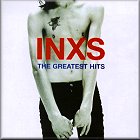 In hindsight, it’s eerie listening to this collection of INXS’s more radio-ready tunes, and it’s hard not to reflect – at least a little bit – upon the doomed falling star that was Michael Hutchence, the group’s lead singer. I’m not going to say that this guy is a fallen genius, but the world most assuredly lost an incredibly dynamic and charismatic performer when Hutchence’s personal demons overtook him.
In hindsight, it’s eerie listening to this collection of INXS’s more radio-ready tunes, and it’s hard not to reflect – at least a little bit – upon the doomed falling star that was Michael Hutchence, the group’s lead singer. I’m not going to say that this guy is a fallen genius, but the world most assuredly lost an incredibly dynamic and charismatic performer when Hutchence’s personal demons overtook him.
But that’s all in retrospect, and this compilation predates those tragic events at any rate. If it’s an INXS song, and you’ve ever heard it on the radio, chances are it’s on this collection. The INXS Greatest Hits disc leans heavily in the direction of the group’s 1986 mega-hit Kick, from which damn near every song seemed to be a single at some point. The later X and earlier Listen Like Thieves, both worth listening to in and of themselves, aren’t represented quite as much. Basically, the Greatest Hits consist of roughly half of Kick with bonus tracks from other  albums.
albums.
Personal favorites here include “Never Tear Us Apart”, “Suicide Blonde” (a song which seemed to roll off the assembly line bearing every sonic trademark of the band packed into four minutes), and, yes, “Need You Tonight”.
- The One Thing (3:24)
- Original Sin (3:46)
- What You Need (3:36)
- Listen Like Thieves (3:47)
- Shine Like It Does (3:06)
- Need You Tonight (3:01)
- Devil Inside (5:11)
- New Sensation (3:42)
- Never Tear Us Apart (3:02)
- Suicide Blonde (3:51)
- Disappear (4:08)
- The Stairs (4:55)
- Heaven Sent (3:21)
- Beautiful Girl (3:29)
- The Strangest Party (These Are The Times) (3:55)
- Deliver Me (3:50)
Released by: Atlantic
Release date: 1994
Total running time: 60:06
Blue Man Group – Audio
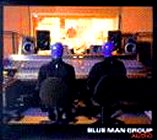 One of the few bastions of the performance-art world to hit some level of critical mass in the eyes of the general public, Blue Man Group – consisting of three guys in black bodysuits with blue skin who create music with any number of invented musical instruments (including lots of PVC plumbing pipe) – has only just recently issued this, their first recorded studio performance.
One of the few bastions of the performance-art world to hit some level of critical mass in the eyes of the general public, Blue Man Group – consisting of three guys in black bodysuits with blue skin who create music with any number of invented musical instruments (including lots of PVC plumbing pipe) – has only just recently issued this, their first recorded studio performance.
Not having seen this trio of outcast Smurfs live, I can’t really offer any sort of qualified opinion on how Audio stacks up to their stage antics, but it’s intriguing and unique music in and of itself. Heavy, tribal-style rhythms permeate the entire collection, with a few doses of guitar and other instruments, though I suspect that some of the conventional-sounding instruments on here aren’t what we might think they are.
Audio won the Grammy this year for Best Instrumental Album, and justifiably so; it has a truly outstanding atmosphere of its own, loaded with the kind of compelling instrumentals that the Alan Parsons Project used to make once upon a time. I haven’t heard anything so weird – and yet so accessible – in ages. In case you’re wondering, these are the guys from the Intel commercials, and that is their music you hear (“Rods and Cones”, a particular favorite of mine, can be heard in the spot involving light bulbs and a vacuum cleaner).
 This title is also available as an Audio DVD, but buyers beware: the DVD title is simply the same audio content as the CD, except in Dolby 5.1 Surround, with a slide show of stills rather than any full-motion video of the Blues in performance.
This title is also available as an Audio DVD, but buyers beware: the DVD title is simply the same audio content as the CD, except in Dolby 5.1 Surround, with a slide show of stills rather than any full-motion video of the Blues in performance.
- TV Song (2:09)
- Opening Mandelbrot (3:14)
- Synaesthetic (5:32)
- Utne Wire Man (3:19)
- Rods and Cones (5:59)
- Tension (2:06)
- Mandelgroove (5:50)
- PVC IV (4:24)
- Club Nowhere (4:51)
- Drumbone (2:46)
- Shadows (2:07)
- Cat Video (2:21)
- Endless Column (8:04)
Released by: Virgin
Release date: 1999
Total running time: 57:35
Tal Bachman
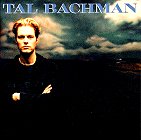 Much was made of Tal Bachman’s lineage about the time “She’s So High”, his debut single, hit it big. Tal is the son of Randy Bachman, late of Bachman-Turner Overdrive and the Guess Who. And lest there be any doubt, Tal Bachman’s tunes prove that he’s fully capable of making dad proud.
Much was made of Tal Bachman’s lineage about the time “She’s So High”, his debut single, hit it big. Tal is the son of Randy Bachman, late of Bachman-Turner Overdrive and the Guess Who. And lest there be any doubt, Tal Bachman’s tunes prove that he’s fully capable of making dad proud.
“She’s So High”, the aforementioned (and somewhat over-played) 1999 single, is just the tip of the iceberg on Bachman’s self-titled freshman set. The closest he came to duplicating that success was with the grungy power ballad “If You Sleep”, which owes some of its exposure to its inclusion on the Dawson’s Creek soundtrack. But perhaps Bachman’s true hidden strength is in his Beatlesque ballads which eschew power chords for strings and other more traditional elements. “Like Nobody Loves Me” and especially “Beside You” are two gorgeous specimens of pure pop music.
Bachman’s harder-edged compositions are a joy to behold as well. “Romanticide” and “Strong Enough” mix catchy hooks with literate lyrics, increasingly a rarity among the younger generation of performers. And  other numbers such as “You Don’t Know What It’s Like” demonstrate that the junior Bachman has most definitely been listening to harmony-heavy bands such as Queen and ELO.
other numbers such as “You Don’t Know What It’s Like” demonstrate that the junior Bachman has most definitely been listening to harmony-heavy bands such as Queen and ELO.
My only question now is: where’s the follow-up?
- Darker Side Of Blue (3:20)
- She’s So High (3:43)
- If You Sleep (4:45)
- (You Love) Like Nobody Loves Me (3:55)
- Strong Enough (4:18)
- You Don’t Know What It’s Like (3:08)
- I Wonder (4:39)
- Beside You (3:15)
- Romanticide (3:23)
- Looks Like Rain (3:30)
- You’re My Everything (3:16)
- I Am Free (5:24)
Released by: Columbia
Release date: 1999
Total running time: 47:34
Neil Finn – One Nil
 The latest from ex-Crowded House frontman Neil Finn is as much a departure from his signature sound with the Crowdies as it is from his previous album, Try Whistling This. With such past collaborators as Jim Moginie of Midnight Oil, former Crowded House producer Mitchell Froom, and Betchadupa guitarist (and Neil’s son) Liam Finn aboard, you’d expect something of the same sound, but there was a lot of experimenting going on with One Nil, possibly due to the influence of new collaborators – and multi-instrumentalists – Wendy and Lisa (yes, as in of early Prince and the Revolution fame). Fuzz guitar, unusual percussion, violin and distorted vocals are front and center on this album. (But, with Froom playing support, so are such cozy familiar elements as Hammond organ.)
The latest from ex-Crowded House frontman Neil Finn is as much a departure from his signature sound with the Crowdies as it is from his previous album, Try Whistling This. With such past collaborators as Jim Moginie of Midnight Oil, former Crowded House producer Mitchell Froom, and Betchadupa guitarist (and Neil’s son) Liam Finn aboard, you’d expect something of the same sound, but there was a lot of experimenting going on with One Nil, possibly due to the influence of new collaborators – and multi-instrumentalists – Wendy and Lisa (yes, as in of early Prince and the Revolution fame). Fuzz guitar, unusual percussion, violin and distorted vocals are front and center on this album. (But, with Froom playing support, so are such cozy familiar elements as Hammond organ.)
One relatively new element which is welcome is Finn’s discovery of ELO-esque wordless background vocals, where a thick tapestry of voices sings a vowel sound in the background. That’s a sound I love in pop music, whether it’s ELO, Queen, Jason Falkner or the Beach Boys, and it works wonders on this album is such songs as “Hole In The Ice” and “Last To Know”.
I’m not sure what wisdom there was in kicking the album off with the slightly nondescript guitar piece “The Climber”, whose lyrics make up somewhat for the shortcomings of the music itself, but it’s not terribly representative of the rest of the disc. Nor, indeed, is any other single song.
My early favorites here are “Hole In The Ice”, the almost Smash Mouth-esque “Don’t Ask”, “Secret God” (which takes a little while to pick up its real pace), “Turn And Run”, “Anytime”, “Driving Me Mad” (an autobiographical number about a songwriter whose evasive muse is disrupting all else in his life) and “Into The Sunset”. In the meantime, this album’s Weird Song Award goes to “Elastic Heart”, which – even though I like it in places – is easily one of the most experimental of One Nil‘s dozen tunes.
 If I have but one disappointment, it is that “Secrets” – a lovely tune demoed on Finn’s web site (with great vocal harmonies by Wendy and Lisa) – did not appear in any form on the finished album. Perhaps it will turn up on a future CD single, but I was a little saddened to see such a great song omitted.
If I have but one disappointment, it is that “Secrets” – a lovely tune demoed on Finn’s web site (with great vocal harmonies by Wendy and Lisa) – did not appear in any form on the finished album. Perhaps it will turn up on a future CD single, but I was a little saddened to see such a great song omitted.
Other than that, however, One Nil is a nice follow-up to Try Whistling This, and will certainly intrigue more than a few Finn fans with its surprising sonic turns.
- The Climber (4:11)
- Rest Of The Day Off (3:48)
- Hole In The Ice (4:10)
- Wherever You Are (4:45)
- Last To Know (3:02)
- Don’t Ask (3:54)
- Secret God (5:27)
- Turn And Run (3:46)
- Elastic Heart (4:00)
- Anytime (3:24)
- Driving Me Mad (3:58)
- Into The Sunset (4:12)
Released by: EMI Australia
Release date: 2001
Total running time: 48:39
Lindsey Buckingham – Law & Order
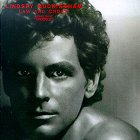 The first solo effort by Fleetwood Mac’s best-known frontman proves that he had a musical voice that was being held back in the structure of the world-famous band. Buckingham’s efforts on the Mac’s Tusk double LP seemed to meet with either indifference or non-comprehension on the part of the listening public, and his contributions to 1981’s Fleetwood Mac album Mirage were, while still experimental, a little bit subdued in places. Law & Order is a demonstration of how brilliant Buckingham can be when set free: the songs retain an experimental feel, but they’re never anything less than commercial.
The first solo effort by Fleetwood Mac’s best-known frontman proves that he had a musical voice that was being held back in the structure of the world-famous band. Buckingham’s efforts on the Mac’s Tusk double LP seemed to meet with either indifference or non-comprehension on the part of the listening public, and his contributions to 1981’s Fleetwood Mac album Mirage were, while still experimental, a little bit subdued in places. Law & Order is a demonstration of how brilliant Buckingham can be when set free: the songs retain an experimental feel, but they’re never anything less than commercial.
Some of Buckingham’s fellow Macsters make cameo appearances, with Christine McVie harmonizing on the dreamy “Shadow Of The West” and Mick Fleetwood lending a very recognizable hand at the drum kit for the now slightly-obscure hit  single “Trouble”. But Buckingham is perfectly capable of shining on his own. The quirky “Bwana”, one of the best things he’s ever done, begs one to put the CD player on “repeat 1.” His cover of the standard “September Song” is a vocal showcase for him, and it’s an interesting contrast to the somewhat more low-key cover of the same song on Jeff Lynne’s Armchair Theatre.
single “Trouble”. But Buckingham is perfectly capable of shining on his own. The quirky “Bwana”, one of the best things he’s ever done, begs one to put the CD player on “repeat 1.” His cover of the standard “September Song” is a vocal showcase for him, and it’s an interesting contrast to the somewhat more low-key cover of the same song on Jeff Lynne’s Armchair Theatre.
- Bwana (3:06)
- Trouble (3:53)
- Mary Lee Jones (3:12)
- I’ll Tell You Now (4:18)
- It Was I (2:39)
- September Song (3:13)
- Shadow Of The West (3:57)
- That’s How We Do It In L.A. (2:52)
- Johnny Stew (3:06)
- Love From Here, Love From There (2:47)
- A Satisfied Mind (2:47)
Released by: Warner Bros.
Release date: 1981
Total running time: 36:25
X-Men – music by Michael Kamen
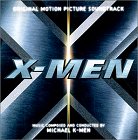 In due time, I shall wax rhapsodic about the X-Men movie, which I thought was hands-down the best comic book film to come out since the 1978 Superman flick. But for the moment, let’s talk music.
In due time, I shall wax rhapsodic about the X-Men movie, which I thought was hands-down the best comic book film to come out since the 1978 Superman flick. But for the moment, let’s talk music.
Michael Kamen, who’s done everything from arranging for Jeff Lynne and Guns ‘N’ Roses to scoring such films as Robin Hood: Prince Of Thieves and the Die Hard and Lethal Weapon series, provides a very hip soundtrack for a very hip movie. Lush orchestral textures are supplemented and sometimes interrupted by ultra-modern dance beats, as well as some post-production effects that give the movie a sound quite unlike anything else to hit the screens of late.
It’s a really cool sound, and almost certain to be imitated very badly over the next three to five years. Kamen will have a tough time topping it for the upcoming X-Men sequel, in fact. My one question is…what will this stuff sound like in, say, 2030? It’s very hip for 2000, but will all of these drum machine effects age any better than, say, Jerry Goldsmith’s avant-garde synths from the Logan’s Run soundtrack? In many ways, the X- Men score sounds like the music from a real-time strategy computer game: cinematic scope with a driving beat to keep everyone wide awake.
Men score sounds like the music from a real-time strategy computer game: cinematic scope with a driving beat to keep everyone wide awake.
Still, it’s good listening. For now. I’d like to hear some choral sounds in the sequel – that would add something really interesting to the mix.
- Death Camp (3:05)
- Ambush (3:26)
- Mutant School (3:48)
- Magneto’s Lair (5:01)
- Cerebro (2:13)
- Train (2:35)
- Magneto Stand-Off (3:01)
- The X-Jet (3:47)
- Museum Fight (2:21)
- The Statue of Liberty (2:38)
- Final Showdown (2:31)
- Logan and Rogue (5:57)
Released by: Decca
Release date: 2000
Total running time: 40:23
Common Ground: The Voices of Modern Irish Music
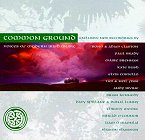 You know, I’ll be the first to fess up that I’m not exactly a Thistle & Shamrock Listener (not that it’s a bad show, and not that I don’t like the music). And I’m a little wary of the mania for all things Celtic that has pervaded the underbelly of pop culture for the past decade or so, despite the fact that I’m able to trace my own lineage straight back to Ireland. Something about everyone embracing this culture just because it’s “in” bugs me – and many of the supposedly Celtic musical acts out there aren’t peddling the sound of old Eire, but rather of Enya, whose sound I associate with new age music more than I do anything that sounds distinctly Celtic. But I’ll expound on this soapbox more later. With all my griping, you’re probably wondering why in the world I even bothered with this CD.
You know, I’ll be the first to fess up that I’m not exactly a Thistle & Shamrock Listener (not that it’s a bad show, and not that I don’t like the music). And I’m a little wary of the mania for all things Celtic that has pervaded the underbelly of pop culture for the past decade or so, despite the fact that I’m able to trace my own lineage straight back to Ireland. Something about everyone embracing this culture just because it’s “in” bugs me – and many of the supposedly Celtic musical acts out there aren’t peddling the sound of old Eire, but rather of Enya, whose sound I associate with new age music more than I do anything that sounds distinctly Celtic. But I’ll expound on this soapbox more later. With all my griping, you’re probably wondering why in the world I even bothered with this CD.
The answer is the wonderful second track, “Mary Of The South Seas”, written and performed by Tim and Neil Finn. Aside from their dedicating the song to their mother’s Irish origins, your guess is as good as mine as to why two performers born and raised in New Zealand are on a compilation of “modern Irish music,” but it’s a lovely song all the same.
There are other good reasons to dig this one out, however; Sharon Shannon’s “Cavan Potholes” is a nicely traditional (and simultaneously modern) Celtic-flavored instrumental. Adam Clayton and Bono of U2 fame turn in a low-key number, “Won’t You Be Back Tomorrow”, and Sinead O’Connor turns in “On Raglan Road”. Toward the end of the disc, the tunes become more traditional and the readings become more tongue-in-cheek – I’m thinking primarily of Elvis Costello’s rendition of “The Night Before Larry Was Stretched” here – but in fine Irish tradition, the producers of this compilation probably expected us to have downed a couple of pints by this point, so I’m willing to forgive.
 Though I originally bought it for one song by a couple of favorite artists, Common Ground quickly opened my eyes to some more good music. And I’m happy – and perhaps just a touch proud – to say that the whole thing smacks more of real Celtic music than a lot of the product that wears that label these days.
Though I originally bought it for one song by a couple of favorite artists, Common Ground quickly opened my eyes to some more good music. And I’m happy – and perhaps just a touch proud – to say that the whole thing smacks more of real Celtic music than a lot of the product that wears that label these days.
- O Bhean A’ti – Maire Brennan (5:13)
- Mary Of The South Seas – Tim and Neil Finn (5:08)
- Tomorrow – Bono and Adam Clayton (4:36)
- Cavan Potholes – Sharon Shannon (4:10)
- Help Me To Believe – Paul Brady (5:56)
- On Raglan Road – Sinead O’Connor (6:05)
- As I Roved Out – Brian Kennedy (4:32)
- The Night Before Larry Was Stretched – Elvis Costello (5:09)
- Mna Na H-eireann – Kate Bush (2:53)
- Whistling Low Errigal – Davy Spillane with Donal Lunny (4:08)
- My Heart’s Tonight In Ireland – Andy Irvine (3:36)
- Cathain – Liam O’Maonlai (3:27)
- Bogie’s Bonnie Belle – Christy Moore (3:18)
Released by: EMI
Release date: 1996
Total running time: 58:11
Survivor – music by Russ Landau & David Vanacore
 “Merchandising, merchandising, where the real money from the movie is made.” The classic line from Spaceballs seems to be appropriate here. Even while the Survivor series was airing, you could order bags and T-shirts with the Survivor logo or sayings like, “The Tribe has spoken”, “Don’t vote me off”, and “Tastes like chicken.” Some even organized Survivor-themed parties, complete with Tiki torches. So, it was inevitable that the music CD would be released. But is it worth it?
“Merchandising, merchandising, where the real money from the movie is made.” The classic line from Spaceballs seems to be appropriate here. Even while the Survivor series was airing, you could order bags and T-shirts with the Survivor logo or sayings like, “The Tribe has spoken”, “Don’t vote me off”, and “Tastes like chicken.” Some even organized Survivor-themed parties, complete with Tiki torches. So, it was inevitable that the music CD would be released. But is it worth it?
If you are a fan of the series, the answer is a resounding yes. This CD contains most of musical themes that were used in the series. While most of the CD sticks with a tropical theme (dare I say World Beat or New Age?) that matches the setting of the series, it does divert on occasion to an occasional techno beat or an Asian theme.
The familiar themes are all there. We have two versions of “Ancient Voices” music which was used during the opening credits, and which is instantly recognizable as being “This Is Survivor”. Another familiar theme is the “Survivor Yell”, which was played at the beginning of each episode to recap the events of previous episodes. And, yet another theme, “Tally The Vote”, was very familiar during tribal council portion of each episode. The other music was played as background during the show.
From listening to this CD, I was reminded of how much music plays a role in a show. I have the funny feeling that if I turned off the volume during the show, it would have appeared to be a boring vacation video. But, with the volume on, the music became part of the story telling. It set the mood of the moment, heightened the emotions of what was going on, or punctuating certain moments. The simple act of extinguishing the torch of a voted-off survivor, as told by the music, became WHAM! Game Over, followed by a tinge of sadness. That’s good sound editing.
However, I also got the sense that there were also budget constraints involved with the music of this show. After listening to this CD several times, I got the sense that at some points, it was someone who was working  on a synthesizer generating the music, sometimes working against a production deadline. In this case, it works in the show’s favor.
on a synthesizer generating the music, sometimes working against a production deadline. In this case, it works in the show’s favor.
There is no doubt that changes are in store for the music for Survivor II: Australian Outback. The tropic theme won’t work there, but there will no doubt be an aboriginal theme.
- Ancient Voices (Extended)
- New Frontier
- Big Drama
- Explorer
- I Can See It
- My Tribe
- Chase Race
- The Strong Will Survive
- Survivor Yell
- Confrontation
- Snake Island
- Mud Bath
- Buzzed
- Island Council
- Rituals
- Voices Of Heaven
- Gold
- Tally The Vote
- Ancient Voices (Main Title Theme)
Released by: TVT Records
Release date: 2000
Total running time: 64:01
Wall Of Voodoo – Call Of The West
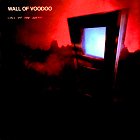 This is a strange little album – that much is undeniable! The vocals are pure They Might Be Giants-esque 60s kitsch, and the instrumentation is firmly lodged in the early 80s explosion of synthesizers, sequencers and drum machines. Some may remember the obscure single “Mexican Radio” which sprang from this album, although there are more memorable songs here, among them the strangely hypnotic “Lost Weekend” and the hyper-kinetic “Tomorrow”, a hysterical ode to procrastination, but we’ll get to that later. My
This is a strange little album – that much is undeniable! The vocals are pure They Might Be Giants-esque 60s kitsch, and the instrumentation is firmly lodged in the early 80s explosion of synthesizers, sequencers and drum machines. Some may remember the obscure single “Mexican Radio” which sprang from this album, although there are more memorable songs here, among them the strangely hypnotic “Lost Weekend” and the hyper-kinetic “Tomorrow”, a hysterical ode to procrastination, but we’ll get to that later. My  personal favorite from this album is the rather short country-guitar-twanging instrumental “On Interstate 15”, a nice little piece with a syncopated beat that also manages to be relaxing somehow. This isn’t for everyone – it’s sure quirky!
personal favorite from this album is the rather short country-guitar-twanging instrumental “On Interstate 15”, a nice little piece with a syncopated beat that also manages to be relaxing somehow. This isn’t for everyone – it’s sure quirky!
- Tomorrow (3:03)
- Lost Weekend (4:58)
- Factory (5:33)
- Look At Their Way (3:18)
Hands of Love (3:52)
- Mexican Radio (4:09)
- Spy World (2:41)
- They Don’t Want Me (4:31)
- On Interstate 15 (2:44)
- Call of the West (5:59)
Released by: I.R.S.
Release date: 1982
Total running time: 41:00
Galaxy Quest – music by David Newman
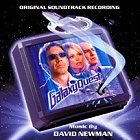 It’s a damn shame that this soundtrack was released only as a composer promo (which is a private pressing of a score paid for by the composer as an audition piece for future work as the studios look the other way, a kind of barely-sanctioned bootleg). Just as the movie Galaxy Quest itself was a hysterical spoof of all things Star Trek, throwing the out-of-work cast of a cancelled cult sci-fi series into the middle of a real interplanetary war, the music from that movie is a glorious send-up/homage to just about every composer who has laid their sonic fingers on that genre, from John Williams to James Horner to Jerry Goldsmith. And the sad thing is, for the most part, it’s a much better listening experience than, say, Goldsmith’s own score from the most recent Star Trek movie. In some ways, with this being the soundtrack to a spoof, the music had the same opportunity as the actors: to ham it up beyond anything that would normally be allowed in the object of the parody. David Newman (102 Dalmatians, Bowfinger, Anastasia and many others) rolls out snare drums, blaring brass, roaring bass notes, thick choral textures…in other words, just about every musical trick denied to the current composers of the Star Trek TV spinoffs. But this isn’t to imply that Galaxy Quest‘s score is all bombast – far from it. There are some musical moments of wonder that put anything since Star Trek: The Motion Picture to shame too.
It’s a damn shame that this soundtrack was released only as a composer promo (which is a private pressing of a score paid for by the composer as an audition piece for future work as the studios look the other way, a kind of barely-sanctioned bootleg). Just as the movie Galaxy Quest itself was a hysterical spoof of all things Star Trek, throwing the out-of-work cast of a cancelled cult sci-fi series into the middle of a real interplanetary war, the music from that movie is a glorious send-up/homage to just about every composer who has laid their sonic fingers on that genre, from John Williams to James Horner to Jerry Goldsmith. And the sad thing is, for the most part, it’s a much better listening experience than, say, Goldsmith’s own score from the most recent Star Trek movie. In some ways, with this being the soundtrack to a spoof, the music had the same opportunity as the actors: to ham it up beyond anything that would normally be allowed in the object of the parody. David Newman (102 Dalmatians, Bowfinger, Anastasia and many others) rolls out snare drums, blaring brass, roaring bass notes, thick choral textures…in other words, just about every musical trick denied to the current composers of the Star Trek TV spinoffs. But this isn’t to imply that Galaxy Quest‘s score is all bombast – far from it. There are some musical moments of wonder that put anything since Star Trek: The Motion Picture to shame too.
The music is helped out tremendously by a theme tune – obstensibly that of the fictional TV show Galaxy Quest – which can be put through seemingly endless major and minor key mutations. The same theme is played as heroic, desperate and tragic, and it works. That theme tune is also included in two different  interpretations on its own; one for the “original series,” and the second – slightly different and more thickly orchestrated – for the Next Generation-style revival which is implied to be on the air in the film’s closing credits.
interpretations on its own; one for the “original series,” and the second – slightly different and more thickly orchestrated – for the Next Generation-style revival which is implied to be on the air in the film’s closing credits.
Now, if only the actual Star Trek music sounded like this.
- Galaxy Quest – Classic TV Theme (0:59)
- Prologue: Galaxy Quest Clip (1:34)
- Pathetic Nesmith (0:59)
- Revealing The Universe (1:03)
- Meet The Thermians (1:11)
- The NESA Protector (0:45)
- Crew Quarters And The Bridge (1:32)
- The Launch (2:08)
- Serris Tortures Captain (1:17)
- Red Thingie, Green Thingie (3:33)
- Shuttle To Planet (1:45)
- Trek Across The Planet (2:55)
- Rolling Sphere (2:35)
- Pig Lizard (1:44)
- Rock Monster (1:56)
- “Digitize Me, Fred!” (1:18)
- “I’m So Sorry” (1:44)
- Fight Episode #17 (1:16)
- Hallway Sneak (1:02)
- Alex Finds Quelick (1:22)
- Omega 13 / Heroic Guy (3:13)
- Big Kiss / Happy Rock Monster (1:19)
- Quelick’s Death (2:09)
- The Battle (3:08)
- Mathazar Takes Command (0:58)
- Serris Kills Everybody (1:30)
- “Goodbye, My Friends” (0:52)
- Crash Landing (0:40)
- Goodbye, Serris (2:05)
- The New Galaxy Quest (1:00)
Released by: Supertracks
Release date: 2000
Total running time: 49:32
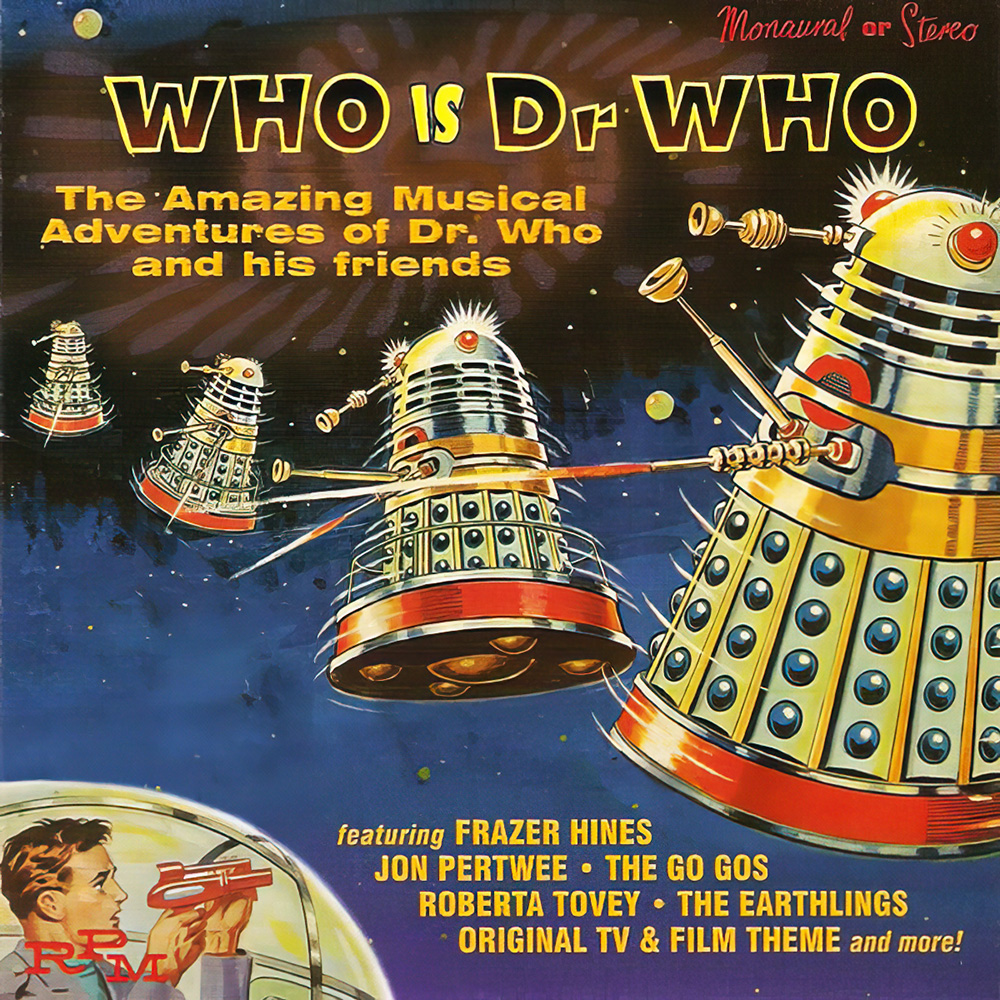
Who Is Dr. Who?
 A release that screams “diehard completists only!” at the top of its lungs, this collection of Doctor Who-inspired novelty tunes and singles spans the years 1963-1973.
A release that screams “diehard completists only!” at the top of its lungs, this collection of Doctor Who-inspired novelty tunes and singles spans the years 1963-1973.
The singles tracked down and remastered by Doctor Who sound guru Mark Ayres for inclusion here cover the entire spectrum, from interesting (Jon Pertwee and Frazer Hines’ amusing takes on the phenomenon), to things that make you wonder why anyone bothered (Roberta Tovey’s attempt to cash-in on her appearance in the two Peter Cushing films of the 1960s, along with several standard-issue guitar rock tracks whose only tie-ins seem to be including the word “Dalek” in their titles), to truly cringe-worthy (the infamous Eric Winstone rendition of the Doctor Who theme tune, and the even more infamous “I’m Gonna Spend My Christmas With A Dalek”). You really have to have a taste for nostalgia – some of it in the worst musical taste you can possibly imagine – to stomach this CD.
The aforementioned tracks by Pertwee (the third Doctor himself) and Hines (who played the second Doctor’s Scottish sidekick Jamie) are actually rather good; Pertwee’s single – performed and produced by former Deep Purple members to the tune of the series theme song – probably sticks the closest to the spirit of the show (the unrelated B-side leaves a little to be desired, save as a reminder of the unmistakable voice of the late, great Mr. Pertwee). Hines’ singles, sadly enough, may be the most musically valid (which ain’t sayin’ much in this case), with some light touches of psychedelia.
I suppose the album would’ve had a gaping hole if “I’m Gonna Spend A Christmas With A Dalek” had been omitted. This shameless cash-in by a band called the Go Gos (years before Belinda Carlisle’s group of the same name, of course) features a lead vocal performed much in the same style as “All I Want For Christmas Is My Two Front Teeth”. Those very teeth will be grating as you listen to this particular track. You should listen to it at least once, just to say you did.
The late Don Harper’s wild, almost retro-loungue-style cover of the theme song is another peak of weirdness in the proceedings. Every once in a while, he hits the notes right. Just for sheer strangeness, it bears at least one listening.
Some hidden treats come in the form of “The Eccentric Dr. Who”, “Daleks And Thals” and “Fugue For Thought”, single arrangements of themes and incidental music from the two 1960s Doctor Who theatrical films which starred Peter Cushing and Roberta Tovey. These are likely to be the only time you’ll ever hear anything even approaching soundtracks from those two movies. Tovey’s own cash-in singles are adorable or annoying, depending upon your mood at the time.
Overall, a choice pick for those who, like myself, absolutely have to hear everything ever recorded in connection to the BBC’s longest running science fiction series. But not even all the fans will necessarily dig this musical trip back in time. If the hinted-at second volume of novelty tunes does happen, it may have some  more accessible material – some understanding of the historical context of these songs, both within the framework of Doctor Who’s history on TV and and within the musical trends of the mid-1960s, is probably required to enjoy them. Extensive liner notes offer lots of that information, but it will ultimately be up to the tastes of individual listeners.
more accessible material – some understanding of the historical context of these songs, both within the framework of Doctor Who’s history on TV and and within the musical trends of the mid-1960s, is probably required to enjoy them. Extensive liner notes offer lots of that information, but it will ultimately be up to the tastes of individual listeners.
- Doctor Who Theme – BBC Radiophonic Workshop (2:22)
- Dr. Who – Eric Winstone and his Orchestra (3:10)
- I’m Gonna Spend My Christmas With A Dalek – The Go Go’s (2:28)
- Landing Of The Daleks – The Earthlings (2:47)
- March Of The Robots – The Earthlings (2:12)
- Dance Of The Daleks – Jack Dorsey and his Orchestra (2:33)
- Who’s Who – Roberta Tovey (2:28)
- Not So Old – Roberta Tovey (2:48)
- The Eccentric Dr. Who – Malcolm Lockyer Orchestra (2:25)
- Daleks And Thals – Malcolm Lockyer Orchestra (2:09)
- Fugue For Thought – Bill McGuffie (2:14)
- Who’s Dr. Who? – Frazer Hines (3:08)
- Punch And Judy Man – Frazer Hines (2:22)
- Who Is The Doctor – Jon Pertwee (2:23)
- Pure Mystery – Jon Pertwee (3:16)
- Dr. Who – Don Harper’s Homo Electronicus (4:19)
- Landing Of The Daleks (alternate version) – The Earthlings (2:43)
- Time Traveller – Frazer Hines (2:34)
Released by: RPM Records
Release date: 2000
Total running time: 48:21
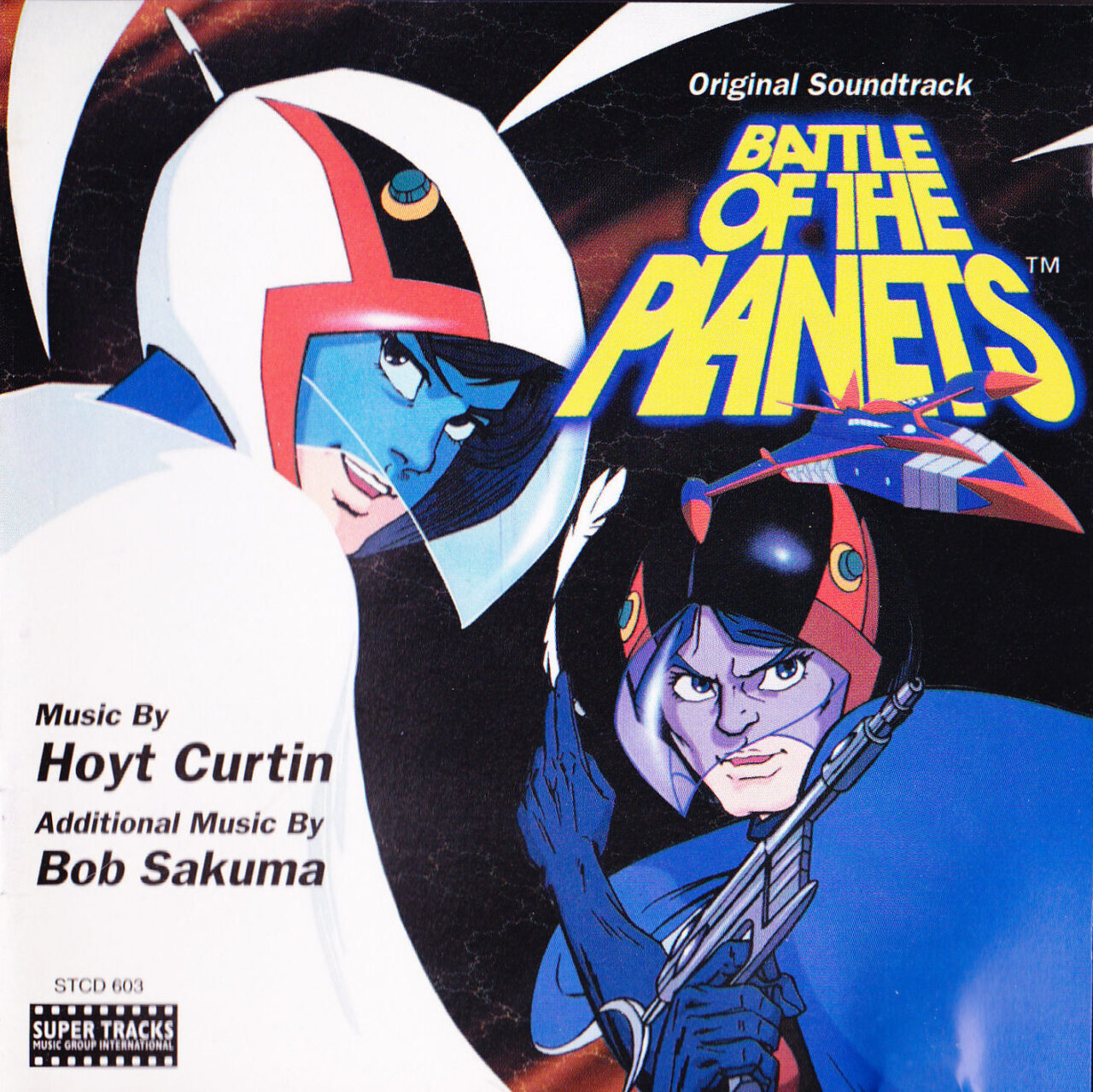
Battle Of The Planets – music by Hoyt Curtin, Bob Sakuma
22 years after the series first premiered in American syndication, this collection of music is finally available, featuring music from Bob Sakuma’s original Gatchaman soundtrack (previously reviewed here) as well as the material composed by the late Hanna-Barbera maestro Hoyt Curtin especially for the extensively re-edited American version of the show.
But like so many things from our childhoods, it might just be that the anticipation for the Battle Of The Planets soundtrack outweighs the actual product. Some of Hoyt Curtin’s music is very good, drawing in equal measure from disco and John Williams’ Star Wars style, while other cues draw more heavily from the former. In places, it sounds like Meco. And while that’s no slight to Meco or to the late Mr. Curtin, who died just last year, it definitely dates the proceedings. To be fair, Bob Sakuma’s original score for Gatchaman also sports some disco stylings, so the two actually dovetail quite well.
For those who splurged on the Gatchaman soundtrack already, you may want to declare victory there – a great deal of the original Gatchaman BGM (background music) release is duplicated on this CD, though with slightly better sound quality. However, you won’t find the cheerful children’s choir singing “Destroy Gallactor!” in Japanese on this CD, so maybe it is worth it to track down both titles. Still, I appreciate the effort to include the original Bob Sakuma score – if not for these tracks, the CD would’ve had a dismally brief (not to mention unjustifiably expensive) running time of just under 35 minutes. Truth be told, only a few purists and fanatics like myself will probably have the original Gatchaman CD, so I doubt very many will be complaining about duplication of material.
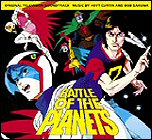 Included as bonus tracks are the audio tracks from six television promos for Battle Of The Planets, as well as a second version of the theme song complete with robust narration – “G-Force! Princess! Tiny! Keyop! Mark! Jason!” – though this version suffers a lot in the sound quality department. It’s very likely that it had to be sourced from a 22-year-old video master tape somewhere.
Included as bonus tracks are the audio tracks from six television promos for Battle Of The Planets, as well as a second version of the theme song complete with robust narration – “G-Force! Princess! Tiny! Keyop! Mark! Jason!” – though this version suffers a lot in the sound quality department. It’s very likely that it had to be sourced from a 22-year-old video master tape somewhere.
Some of my favorite cues from Hoyt Curtin are those composed for the scenes of robot advisor 7-Zark-7 (and his equally robotic dog, 1-Rover-1). As is generally well-known, these robots didn’t exist in the original Japanese series, added at the behest of American syndicator Sandy Frank to further solidify the Star Wars cash-in by including cute robots to comment on the action (and to fill out the vast amounts of program time which were lost with the surgical removal of the original show’s near-legendary violent scenes). The robots’ cues are bizarrely calliope-like, using trippy late 70s synths for what once passed for a futuristic sound.
If you’re ready for a trip back in time, complete with sometimes painful reminders of how discofied incidental music could be back then, then I give this CD a hearty four-star recommendation. But if you’re expecting to compare it to Goldsmith, Williams, Horner and/or Silvestri, maybe you should give up and save your money for something more modern. Despite the disco elements, I thought it was an excellent vehicle for some childhood nostalgia – and, of course, a  full-page ad for Rhino’s upcoming Battle Of The Planets video and DVD releases this fall is included in the liner notes booklet. (The booklet may just be the real prize of this release, with extensive biographical notes on both Curtin and Sakuma and previously unknown facts about their involvement in the series. I was a little surprised to read that Sakuma based his music on the early 70s style of Chicago!)
full-page ad for Rhino’s upcoming Battle Of The Planets video and DVD releases this fall is included in the liner notes booklet. (The booklet may just be the real prize of this release, with extensive biographical notes on both Curtin and Sakuma and previously unknown facts about their involvement in the series. I was a little surprised to read that Sakuma based his music on the early 70s style of Chicago!)
Battle Of The Planets – music by Hoyt Curtin (1978)- Battle Of The Planets main title (1:32)
- Love In The Afterburner (1:29)
- Ready Room (2:02)
- Alien Planet (2:52)
- Phoenix Raising (2:11)
- Space On Fire (2:08)
- Robot Hijinks (0:58)
- Alien Trouble (1:25)
- Return To The Alien Planet (3:00)
- Melting Jets (0:53)
- Romance In An Afterburner’s Light (1:30)
- The Robot’s Dog: 1-Rover-1 (0:54)
- Firefight (1:35)
- Alien Trap (2:20)
- 7-Zark-7’s Song (1:23)
- More Alien Trouble (1:29)
- The Chief Alien Shows Up (0:34)
- Come Out, Come Out (1:30)
- Victory (1:09)
Gatchaman – music by Bob Sakuma (1972)
- Emblem G (3:10)
- Spectra Versions (3:50)
- Fighting Phoenix (3:22)
- Coral Reef (0:26)
- Crescent Moon (3:17)
- Holding Up A Shade (3:37)
- Zoltar, Fastening The Armor (0:32)
- Fighter G (3:54)
- Red Illusion (4:37)
- The Earth Is Alone! (1:53)
- A Vow To The Sky (3:12)
- Countdown (3:39)
- Like The Phoenix (3:26)
Bonus Tracks
- Promo #1 – The Luminous One #1 (0:32)
- Promo #2 – G-Force vs. Zoltar (0:32)
- Promo #3 – 7-Zark-7 and Company (0:32)
- Promo #4 – The Luminous One #2 (0:32)
- Promo #5 – Commander Mark, Jason (0:32)
- Promo #6 – Princess, Tiny, Keyop (0:32)
- Battle Of The Planets main title reprise with narration (1:31)
Released by: Super Tracks Music Group
Release date: 2001 (re-released by Silva in 2004 with different track list)
Total running time: 73:32
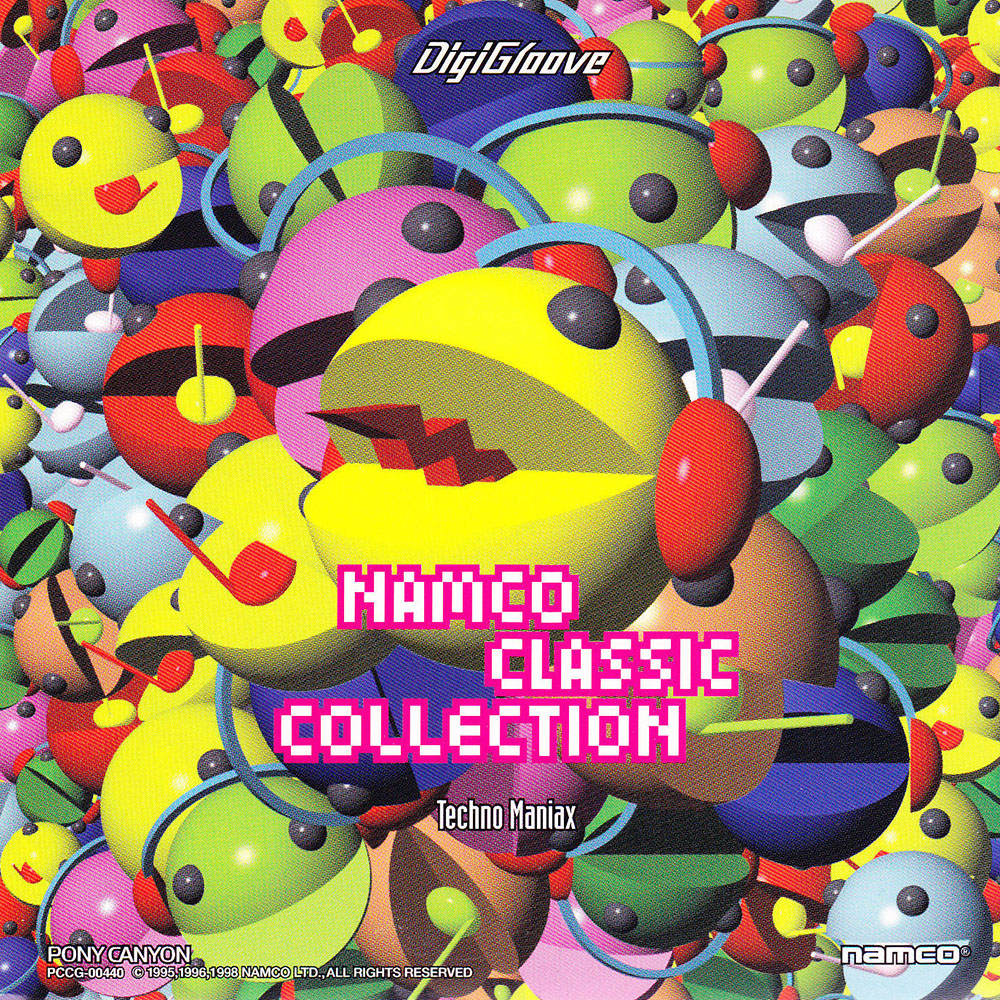
Namco Classic Collection
Here it is, possibly the weirdest tie-in album ever. You’ve seen music devoted to Muppets, Teletubbies, Power Rangers, Powerpuff Girls, and any number of other bizarre mascots. But what about a modern-day musical tribute to Pac-Man and his fellow retro-video game stars? That’s the idea behind this limited edition Japanese CD licensed by the jolly joystick giants at Namco, one of the few game manufacturers to have weathered the various storms of the game industry, so naturally the album focuses on the characters of Namco’s arcade game properties some two decades ago.
Naturally, your ability to get anything out of this album will rely very heavily upon your ability to handle house music, as well as how familiar you are with the sounds of various and sundry video games which are now, technically, old enough to drink.
The “Pac-Man Remix” is whimsical, funny, and loaded with audio samples from the game, but when one takes into account that everyone from Aphex Twin to D.J. Maui has already mined that territory adequately, I’m not sure this mix stands out. The track devoted to obscure sequel/upgrade kit New Rally-X is a little more low-key, with game samples not making their first appearance until nearly two minutes into the proceedings. This trend is carried further in the first track devoted to Galaga, my favorite game ever to emerge from Namco’s stable, in which no samples or even musical themes from the game appear, resulting in some rather repetitive dance music with no audible ties to its inspiration. The guitar-driven Dig Dug tune bears somewhat more resemblance to the omnipresent tune that accompanies the game of the same name. The second Mappy mix brings actual samples of the game’s sounds back to the fore, along with appropriately sped-up “mouse” voices counting off “1, 2, 3, 4!” at various intervals throughout the song – though the mind-bendingly staccato drum machine beat tries even my patience. The mix devoted to Xevious leans heavily on samples, and is actually one of the best tracks of the whole collection. The honors ultimately go to the “Pac-Man Remix” and the eight-minute “Galaga: Tiny Voice Production Remix” – which even quotes the musical greeting from Close Encounters Of The Third Kind along with various game sounds (!). Those two tracks are really the epitome of what I was expecting – no, scratch that, hoping for – with this CD.
So, to wrap it up, will anyone aside from me enjoy this CD? Well, it’s entirely possible that I may be the only one. Even thought I walked into this one with an open mind, such tracks as the “Galaga: Feel Like Makin’ Jazz” mix and the “Mappy: Latin Makes You Happy” Remix (both, incidentally, remixed by Akakage) suffer from a total disconnect from their titular inspiration, and made me want to hit the “skip track” button on my CD player. On the other hand, I was greatly relieved that Ryosuke Imai’s Galaga remix, the best thing on here, was also the longest track on offer. But in some ways…the music from the various Namco Museum games for the Playstation is superior, sticking much more closely to the source material musically, if not necessarily using samples. (Why Namco didn’t throw this in as a bonus, or perhaps as a proof-of-purchase premium, with its aforementioned retro game collections is a mystery to me. That’s their target audience!) The packaging is eye-catching, and includes a sticker of the colorful cover art (dozens of CGI Pac-Men wearing headphones and eating musical notes).
 This is one of those way-way-out-there entries in my vast library which, like Sharkbait’s Blowtorch Facelift CD, will probably mean something different to everyone who hears it. I liked most of it, but it’s not going to be everyday listening – the mood would definitely have to hit me to sit down and pour some of these tracks into my ears.
This is one of those way-way-out-there entries in my vast library which, like Sharkbait’s Blowtorch Facelift CD, will probably mean something different to everyone who hears it. I liked most of it, but it’s not going to be everyday listening – the mood would definitely have to hit me to sit down and pour some of these tracks into my ears.
- Mappy: Latin Makes You Happy Remix – remixed by Akakage (6:23)
- Pac-Man Remix – remixed by Yoshihiro Sawasaki (4:27)
- New Rally-X: Checkered Flag Mix – remixed by Yoshiaki Onishi (6:00)
- Galaga: Feel Like Makin’ Jazz Mix – remixed by Akakage (6:24)
- Dig Dug: Pro Action Replay Remix – remixed by Takeo Sasada (3:05)
- Mappy Remix – remixed by Yoshihiro Sawasaki (5:09)
- Xevious: Maximum Power of Triple Z80 Remix – remixed by Seiya Nakano (4:38)
- Galaga: Tiny Voice Production Remix – remixed by Ryosuke Imai (8:01)
Released by: Pony Canyon, Inc.
Release date: 1998
Total running time: 44:07
Star Wars Episode I – The Ultimate Edition
 Much criticism has been levelled at this double-CD release purporting to offer listeners “every note of music from The Phantom Menace, and for the life of me, I still have yet to figure out why. Not quite two years ago, I got into a pretty public debate with Film Score Monthly’s Lukas Kendall about whether or not we deserved a two-CD set containing Episode I‘s full score in May, 1999. Instead, Sony gave us a single-CD edition, containing several concert versions and suites combining music from unrelated scenes. Now, I was always a big fan of the original Star Wars soundtrack double LP, back in the days before you could actually put the entire score (plus extras) on two CDs – I have some of those concert suites memorized. I don’t object to suite CDs, so long as the original score is available somewhere. So, despite the objections of quite a few really finicky fans, we finally have that full score release for The Phantom Menace.
Much criticism has been levelled at this double-CD release purporting to offer listeners “every note of music from The Phantom Menace, and for the life of me, I still have yet to figure out why. Not quite two years ago, I got into a pretty public debate with Film Score Monthly’s Lukas Kendall about whether or not we deserved a two-CD set containing Episode I‘s full score in May, 1999. Instead, Sony gave us a single-CD edition, containing several concert versions and suites combining music from unrelated scenes. Now, I was always a big fan of the original Star Wars soundtrack double LP, back in the days before you could actually put the entire score (plus extras) on two CDs – I have some of those concert suites memorized. I don’t object to suite CDs, so long as the original score is available somewhere. So, despite the objections of quite a few really finicky fans, we finally have that full score release for The Phantom Menace.
So what’s their problem? It seems that some listeners are critical of the edits made to the music for the movie, and would rather hear the original session masters as recorded, prior to being chopped up for placement with scenes of the film that they weren’t necessarily meant to accompany. I can buy that complaint, actually. It was neat hearing the huge amount of stuff that was left out of the opening scenes of The Empire Strikes Back. But at the same time, if this is all we get, I’ll be satisfied. (Not that I’m holding my breath, mind you – three seems to be the magic number for Star Wars soundtracks, as all of the original trilogy soundtracks evolved slowly from abridged LPs to expanded Anthology box set releases to Special Edition full score releases. I’m sure that late 2001 or early 2002 will see the release of, at the very least, a single CD with “outtakes and unused music, heard here for the first time ever!”)
While some reviewers have commented on the blatant sound of the edits, I was only bothered by a very small number of the edits in the music. They don’t exactly stick out like a sore thumb…for the most part. A few of them did get my teeth grating, but not a large enough number to have me using the CDs for a frisbee.
If I have but a single complaint about the Ultimate Edition, it’s the packaging. The double-CD set and 64-page booklet are crammed into what I would charitably describe as a flimsy cardboard package which will not, mark my words, stand up to average jewel case wear and tear for very long. I would much rather have had the traditional double-size 2-CD jewel case with a removable booklet. Granted, the booklet is too thick to be squeezed into a slimline double jewel case. The booklet itself is also part of my complaint: it was originally promised to be a lavish exploration of the making of the music, which practically screams “extensive interview with John Williams,” something I was really looking forward to. Instead, the book is a lazy effort, with a large, page-filling color still from the movie to accompany – get this – each track title. The booklet was truly my biggest disappointment for this package. But my jewel cases tend to sit still and gather dust anyway, and Williams has been interviewed elsewhere about Phantom Menace. The music itself is a four-star special, not to be missed.
Some of the highlights omitted by the original single-disc release include the complete pod race sequence (“Anakin Defeats Sebulba”), the ominous “Anakin Is Free” (a rousing choral reading of the Force theme as  Anakin turns to leave his mother behind), and “The Racer Roars To Life” / “Anakin’s Midi-Chlorian Count”, a beautiful piece which goes some way toward confirming my theory that the new composition at the end of Return Of The Jedi: Special Edition will be heard in the next two movies as the more mature Anakin’s theme.
Anakin turns to leave his mother behind), and “The Racer Roars To Life” / “Anakin’s Midi-Chlorian Count”, a beautiful piece which goes some way toward confirming my theory that the new composition at the end of Return Of The Jedi: Special Edition will be heard in the next two movies as the more mature Anakin’s theme.
Disc one
- 20th Century Fox Fanfare (0:23)
- Star Wars Main Title (1:24)
- Boarding The Federation Battleship (2:31)
- Death Warrant For Qui-Gon And Obi-Wan (1:18)
- Fighting The Destroyer Droids (1:44)
- Queen Amidala Warns The Federation (2:23)
- The Droid Invasion (1:00)
- Swimming To Otoh Gunga (0:56)
- Inside The Bubble City (3:05)
- Attack Of The Giant Fish (1:37)
- Darth Sidious (1:04)
- The Giant Squid And The Attack On Theed (1:18)
- Qui-Gon And Obi-Wan Rescue The Queen (2:09)
- Fighting The Guards (1:42)
- Escape From Naboo (2:04)
- Enter Darth Maul (1:07)
- The Arrival At Tattooine (2:28)
- Street Band Of Mos Espa (1:17)
- Padme Meets Anakin (1:12)
- Desert Winds (1:28 bonus track)
- Jar Jar’s Run-In With Sebulba (1:18)
- Anakin’s Home And The Introduction To Threepio (2:42)
- Darth Sidious And Darth Maul (1:12)
- Talk Of Podracing (2:59)
- Watto’s Deal / Shmi And Qui-Gon Talk (2:24)
- Anakin, Podracer Mechanic (1:38)
- The Racer Roars To Life / Anakin’s Midi-Chlorian Count (1:24)
- Darth Maul And The Sith Spacecraft (1:00)
- Mos Espa Arena Band (0:53)
- Watto’s Roll Of The Die (1:59)
- The Flag Parade (1:14)
- Sebulba’s Dirty Hand / Qui-Gon’s Pep Talk (1:37)
- Anakin Defeats Sebulba (2:17)
- Hail To The Winner, Anakin Skywalker (1:13)
- The Street Singer (1:13)
Disc two
- Anakin Is Free (5:04)
- Qui-Gon And Darth Maul Meet (1:48)
- Anakin And Group To Coruscant (4:11)
- The Queen And Palpatine (0:41)
- High Council Meeting (2:37)
- The Senate (1:12)
- Anakin’s Test (3:41)
- Qui-Gon’s Mission / Obi-Wan’s Warning (3:47)
- Nute And Rune Confer With Darth Sidious (0:29)
- The Queen And Group Land On Naboo (2:19)
- Jar Jar Leads Group To The Gungans (2:25)
- War Plans (2:31)
- Darth Sidious Receives News Of The Gungan Army (0:25)
- The Gungans March (0:57)
- The Queen And Her Group Sneak Back To The Palace (0:18)
- The Battle Begins (0:24)
- The Republic Pilots Take Off Into Space (1:26)
- Activate The Droids (0:44)
- The Gungans Fight Back (0:24)
- The Duel Begins (0:51)
- Anakin Takes Off In Spaceship (0:47)
- The Duel Continues (0:59)
- The Battle Rages On (1:59)
- Qui-Gon, Obi-Wan And Darth Maul Continue Battle (1:22)
- Qui-Gon, Darth Maul And The Invisible Wall (0:14)
- The Gungans Retreat And The Queen Surrenders (2:18)
- The Death Of Qui-Gon And The Surrender Of The Gungans (2:28)
- The Tide Turns / The Death Of Darth Maul (3:24)
- The Queen Confronts Nute And Rune (1:47)
- The Funeral Of Qui-Gon (1:18)
- The Parade (1:24)
- End Credits (8:14)
- Duel Of The Fates – Movie Dialogue Version (4:21 bonus track)
Released by: Sony Classical
Release date: 2000
Disc one total running time: 57:13
Disc two total running time: 66:49

Science Ninja Team Gatchaman – music by Bob Sakuma
 Never heard of Gatchaman? Oh, yes you have. Gatchaman is the story of five highly-trained young people, given state-of-the-art equipment and Earth’s most advanced spacecraft, the God Phoenix. Their mission is to employ their dual skills – ninja fighting and scientific knowledge – to defeat the evil Sosai X, who endlessly conjures up elaborate schemes in an effort to conquer Earth. It’s just possible that this early 70s anime’ series was the birth of the five-kids-in-spandex genre that later gave rise to such godawful live-action train wrecks as Power Rangers and VR Troopers. It’s also just possible that you remember the English dubbed version from the early 80s, retitled Battle of the Planets.
Never heard of Gatchaman? Oh, yes you have. Gatchaman is the story of five highly-trained young people, given state-of-the-art equipment and Earth’s most advanced spacecraft, the God Phoenix. Their mission is to employ their dual skills – ninja fighting and scientific knowledge – to defeat the evil Sosai X, who endlessly conjures up elaborate schemes in an effort to conquer Earth. It’s just possible that this early 70s anime’ series was the birth of the five-kids-in-spandex genre that later gave rise to such godawful live-action train wrecks as Power Rangers and VR Troopers. It’s also just possible that you remember the English dubbed version from the early 80s, retitled Battle of the Planets.
Bob Sakuma’s oft-recycled music accompanied both the Gatchaman team and their American counterparts (a.k.a. “G-Force”), and anyone who spent any time with the show will recognize the melodies and cues lined up on this survey of the show’s music.
I’ll be up-front and advise you to steer clear of this if you are not a Gatchaman/Battle of the Planets fan. This album is loaded with really, really short cues, all crammed into longer tracks. Some of the pieces on this selection of background music are over in all of three seconds – such is the brevity of music composed for animation. Some of the music is really a bit dated too – one doesn’t hear quite so much Hammond organ in science fiction (or, for that matter, animation) these days.
That said, there is a lot of very interesting music here, and some of it stands up quite well. This, along with the Space Battleship Yamato (a.k.a. Star Blazers) soundtrack, may be enough to help you journey back to those post-grade-school afternoons of your youth.
It’s also worth noting that your favorite pieces of music from Battle Of The Planets might not be present here; the Americanized version of the series had music added by U.S. composer Hoyt Curtin, and Curtin’s music – including the Battle Of The Planets theme song – is not represented on this CD. (The original Gatchaman theme,  however, is almost disturbing – its title translates to “Destroy Gallactor!” and it is cheerfully sung by a children’s choir.)
however, is almost disturbing – its title translates to “Destroy Gallactor!” and it is cheerfully sung by a children’s choir.)
Almost all of the non-vocal music from the Gatchaman soundtrack was recently included on a semi-official Battle Of The Planets CD, though this album remains the only place to find the vocal tracks.
- Prologue (1:27)
- Science Ninja Team (0:10)
- Gatchaman main theme – Destroy Gallactor! (1:17)
performed by Columbia Cradle Club- Emblem G (3:16)
- The White Shadow (0:04)
- International Science Organization (0:38)
- Birdstyle (0:45)
- Scramble (0:53)
- Gather God Phoenix (0:53)
- Gallactor Versions (3:56)
- Dangerous (0:47)
- Zero Angle (1:38)
- Sniper (0:33)
- Death Clash (0:30)
- Iron Beast (0:21)
- Fighting Phoenix (3:28)
- Snack Jun (0:16)
- Gatchaman Attack (1:28)
- Birdmissile (0:29)
- And Then…Victory (0:40)
- Return To The Sunrise (0:33)
- Coral Reef (0:28)
- Crescent Moon (3:24)
- Good Morning Phoenix (0:52)
- Morning Service (0:33)
- Croissant (0:21)
- At Dusk (0:42)
- Goodnight Seahorse (0:49)
- Behind Shaded Eyes (3:46)
- Shadow Of Gallactor (0:26)
- Burning City (0:30)
- Into Dark Depths (0:35)
- The Hidden Devil (0:24)
- A Night Of Unrest (0:53)
- Devastation Of The Earth (0:45)
- Katse, The Helmet Strap Tightens (0:33)
- Gatchaman (0:05)
- Fighter G (4:00)
- Invasion Assault (0:38)
- Army Corps (0:34)
- Capture (0:41)
- Pursuit (0:33)
- A Sudden Change (0:16)
- Violent Force (0:10)
- Red Illusion (4:40)
- Red Wing (0:06)
- Red Partner (2:17)
- Red Memory (1:00)
- Red Impulse (1:11)
- Alone On The Earth (0:52)
- A Pledge To The Open Sky (3:13)
- Surrender To Fate (1:16)
- Strong Flapping Wings (0:43)
- Stable, Lifting Wings (1:10)
- 0002 (3:48)
- Unknown Figure (0:29)
- Mutant (0:50)
- Cross Karakorum (0:47)
- A Living Island (0:34)
- Target X (0:16)
- Rushing In (0:39)
- The Phoenix Can (3:30)
- Visiting Tomorrow (0:23)
- We Are The Flock… (1:06)
- Daybreak (0:42)
- The Immortal Ninja Team (1:10)
- Epilogue (1:28)
- Ending Theme Song: Gatchaman’s Song (1:28)
performed by Masato Shimon & The Columbia Cradle ClubReleased by: Columbia Nippon
Release date: 1981 (re-released on CD in 1995)
Total running time: 42:59
Electric Light Orchestra – Live At The BBC
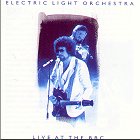 Now discontinued by Eagle Records, a small label which has unleashed a small slew of ELO live albums in recent years, this two-disc set is a compilation of live cuts as originally broadcast on BBC Radio’s In Concert series.
Now discontinued by Eagle Records, a small label which has unleashed a small slew of ELO live albums in recent years, this two-disc set is a compilation of live cuts as originally broadcast on BBC Radio’s In Concert series.
The first disc kicks off with an extended jam built around what would appear to be an early version of “Boogie #1: From The Sun To The World” from ELO’s second album. The lyrics are wildly different, as are large portions of the lengthy solos, some of which sound like they were kept in mind during the making of On The Third Day. Moog synths and the glorious sound of the group’s early (pre-Mik Kaminski) string section battle it out for prominence. Kuiama turns into a surprisingly relaxed jam, with the three-piece string section shining once more until just before the end of the song (at which point they go hideously out of key). “In The Hall Of The Mountain King” suffers a similar fate – starts out strong, becomes a great chugging Russian dance of sorts, and then falls apart right before the end. By the time “Roll Over Beethoven” rolls around, the group has gotten the hint – it doesn’t last as long as the other numbers, and doesn’t outstay its welcome.
Then we travel forward in time by about a year with a nice rendition of “Ocean Breakup / King Of The Universe”, the indecipherable opening medley from ELO’s third album, On The Third Day. Following the album’s running order, this segues into a low-key (and on-key) “Bluebird Is Dead” and “Oh No, Not Susan” (the latter complete with non-radio-friendly F-word in its lyrics!). Jeff Lynne’s vocals during this live set start out very much in the background, often overshadowed by the instruments, but his performance becomes much more assured by the time “New World Rising” arrives. By this point, Mik Kaminski has joined the band, and after the Third Day medley and a brief introduction of the band members, he takes center stage with his self-penned classical hoedown solo. Another performance of “Mountain King” proves to be a little more polished, and leaps abruptly into a rumbling cover “Great Balls Of Fire”.
The second disc leapfrogs past Eldorado and starts with “Fire On High”, the chugging instrumental which inaugurated 1975’s Face The Music LP. The hard-rocking “Poker” is next up, though this rendition seems to be dominated more by synths than electric guitars. But it’s not until “Nightrider” that the band really starts to shine. The excellence carries over to the band’s second crack at a Third Day medley, with even the between-song interludes from the album spreading out into a luxurious jam highlighting the abilities of the string trio. That portion of the band continues to carry things along into “Bluebird Is Dead” and “Showdown” (and I’ll still take live Showdown over the album version any day). A pre-recorded “Eldorado Overture” leads into a fair reading of “Can’t Get It Out Of My Head” (though I still question the need to insult the listener’s intelligence – or waste his time – by not editing pre-recorded bits out of live albums). “Poor Boy (The Greenwood)” fares much better on stage, though its string parts – arranged for a full orchestra – seem to be a little more than the group’s live string trio can handle. One of my favorites from Eldorado, “Illusions In G Major”, relies much less on the string section and turns out to be the best number in the Eldorado set. After Bev Bevan tries to rouse a seemingly lethargic audience, the band launches into “Strange Magic” – in which Bev’s bass backing vocals can be heard much louder than Lynne’s lead! The audience finally wakes up and claps along to “Evil Woman” before Bev even picked up his sticks, and audience participation night continues into the final number, a killer “Ma-Ma-Ma Belle” jam.
This two-disc document of early live ELO is bound to be of interest to ardent fans as well as collectors, now that it has been discontinued from the Eagle Records catalogue. But it’s not the rollicking, polished live set one hears on Live At Winterland – and, thankfully, nor is it the over-polished, largely pre-recorded, uninspiring set from the Live At Wembley CD and DVD. If nothing else, Live At The  BBC helps one gain a greater appreciation for drummer Bev Bevan and the three-part string section that represented ELO’s orchestral ambitions on stage, both before and after the orchestra became a literal one on the group’s albums. But more casual listeners, and even some fans, may be appalled by the string section’s misfires in the earlier material. Perhaps this one could have been pared down to the second disc by itself.
BBC helps one gain a greater appreciation for drummer Bev Bevan and the three-part string section that represented ELO’s orchestral ambitions on stage, both before and after the orchestra became a literal one on the group’s albums. But more casual listeners, and even some fans, may be appalled by the string section’s misfires in the earlier material. Perhaps this one could have been pared down to the second disc by itself.
Disc one
- From The Sun To The World (11:39)
- Kuiama (10:26)
- In The Hall Of The Mountain King (8:10)
- Roll Over Beethoven (5:09)
- King Of The Universe (4:54)
- Bluebird Is Dead (4:09)
- Oh No Not Susan (2:43)
- New World Rising (6:39)
- Mik’s Violin Solo / Orange Blossom Special (2:37)
- In The Hall Of The Mountain King (4:56)
- Great Balls Of Fire (3:25)
Disc two
- Fire On High (5:35)
- Poker (4:20)
- Nightrider (4:59)
- On The Third Day medley (13:14)
- Showdown (4:45)
- Eldorado (6:05)
- Poor Boy (The Greenwood) (2:43)
- Illusions In G Major (3:39)
- Strange Magic (3:37)
- Evil Woman (5:19)
- Ma-Ma-Ma Belle (5:32)
Released by: Eagle / Edel
Release date: 1999
Disc one total running time: 64:49
Disc two total running time: 59:50
Close Encounters Of The Third Kind – John Williams
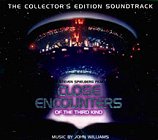 John Williams’ first project after the universally-acclaimed Star Wars soundtrack couldn’t have been much more different from George Lucas’ space opera. Williams provided some very challengingly abstract music, as well as some wonderfully intelligent melodies, for Steven Spielberg’s definitive UFO film Close Encounters Of The Third Kind.
John Williams’ first project after the universally-acclaimed Star Wars soundtrack couldn’t have been much more different from George Lucas’ space opera. Williams provided some very challengingly abstract music, as well as some wonderfully intelligent melodies, for Steven Spielberg’s definitive UFO film Close Encounters Of The Third Kind.
It could be argued that, with the cacophonous bursts of atonal sound that occur frequently in the first half of the movie, Williams ventured into more mature musical territory than he did with Star Wars, but he also created plenty of memorable motifs, which took over the bulk of the score as Richard Dreyfuss’ character embarked on a quest to find the truth.
Included on the CD is the complete end suite in which aliens and humans attempt to communicate with one another through a musical sequence almost sounding like dueling tubas. Though it has been re-recorded on various soundtrack collections (among them Silva’s Space and Beyond), the original has a unique sound and stands out as one of the highlights of both movie and soundtrack.
The extensive final cue, which picks up when human test pilots volunteer to serve as “exchange students” – leaving Earth aboard the aliens’ ship to learn about their culture – and continuing right on through the end credits, contains some of the most memorable and beautiful music ever created for a film. The gentle rendition of “When You Wish Upon A Star” surprised me when I first heard it, but it also fits perfectly, lending  an air of innocence to the benign alien encounter, a nice shift away from the abstract horror of the movie’s first reel.
an air of innocence to the benign alien encounter, a nice shift away from the abstract horror of the movie’s first reel.
I can’t recommend this soundtrack highly enough.
- Opening – Let There Be Light (0:46)
- Navy Planes (2:07)
- Lost Squadron (2:23)
- Roy’s First Encounter (2:41)
- Encounter At Crescendo Summit (1:21)
- Chasing UFOs (1:18)
- False Alarm (1:42)
- Barry’s Kidnapping (6:19)
- The Cover-Up (1:26)
- Stars And Trucks (0:44)
- Forming The Mountain (1:50)
- TV Reveals (1:50)
- Roy And Gillian On The Road (1:10)
- The Mountain (3:31)
- Who Are You People? (1:35)
- The Escape (2:18)
- The Escape – alternate cue (2:40)
- Trucking (2:01)
- Climbing The Mountain (2:32)
- Outstretch Hands (2:48)
- Light Show (3:43)
- Barnstorming (4:26)
- The Mothership (4:34)
- Wild Signals (4:12)
- The Returnees (3:45)
- The Visitors / Bye / End Titles: The Special Edition (12:31)
Released by: Arista
Release date: 1978 (special edition released in 1998)
Total running time: 77:21
